Most Popular
Chatgpt and similar ai is not going to kill you, but ignoring it might.
11 days ago

Writing a Personal Essay From the Start
10 days ago
Overcoming Challenges in Analytical Essay Writing
Schools bet on performance-based salaries for teachers. did it pay off, how should i format my college essay properly, how to write a movie review.

Have you ever watched a film so captivating that your head starts buzzing from all the symbolism? Or, perhaps, you are filled with rage, thinking how did this even make it to the theater screens? Filmmaking is supposed to evoke emotions, whether good or bad, and there is no better way to let them out than in a movie critique. Writing a film review is no rocket science, but it takes careful preparation and in-depth research. So, buckle up, while we explain how to approach this topic and honor (or dishonor) cinematography in a proper way!
Preparation for Writing a Movie Review
Writing a movie review can be an art project in itself; it requires much more than merely watching a film. You have to keep your eyes peeled for every single detail, character, and plot twist. It can be a bit disheartening starting on your work right away since it takes planning and preparation. Let’s structure everything so that you don’t get lost.
📼 How to Choose a Movie to Review
If you weren’t tasked with a specific piece to review, choosing “the right” movie is an important process (obviously). Your film of choice is the main basis of the overall text, so you have to have a serious approach. One surefire way to choose a movie is to look for those titles that spark your attention, your interest, or films that are particularly popular or have controversial opinions on them. This is necessary due to the fact that such cases provide you with enough thematic information to bounce off of and evaluate the film. Maybe the love/hate for the film wasn’t deserved and you want to dig deeper into it? The choice is all yours. This could be a new release, a classic, or even an indie film that’s generating buzz. The main point, just like in many other types of writing, is to engage the audience and provide an in-depth analysis.
🖇 Taking Notes When Watching the Film
The process of taking notes is what will lead your narrative further. It is almost impossible to keep every single thing on your mind, especially when watching longer films for two hours or more. Not only should you pay attention to the main plotline and jot down the main elements and observations as well as extra details, but also pose questions to elaborate further in the review. Pay attention to everything that is happening: storyline, character developments, camera work, the choice of music and costume. Everything that adds to the story in your opinion should be mentioned. However, don’t waste time noting every frame, because it dilutes the main focus and can drive you away from forming a clear and concise thesis. You will thank yourself for preparing high-quality notes when starting with the actual text.
If you need further help with what to look for, here are some ideas on what you can note while watching the movie:
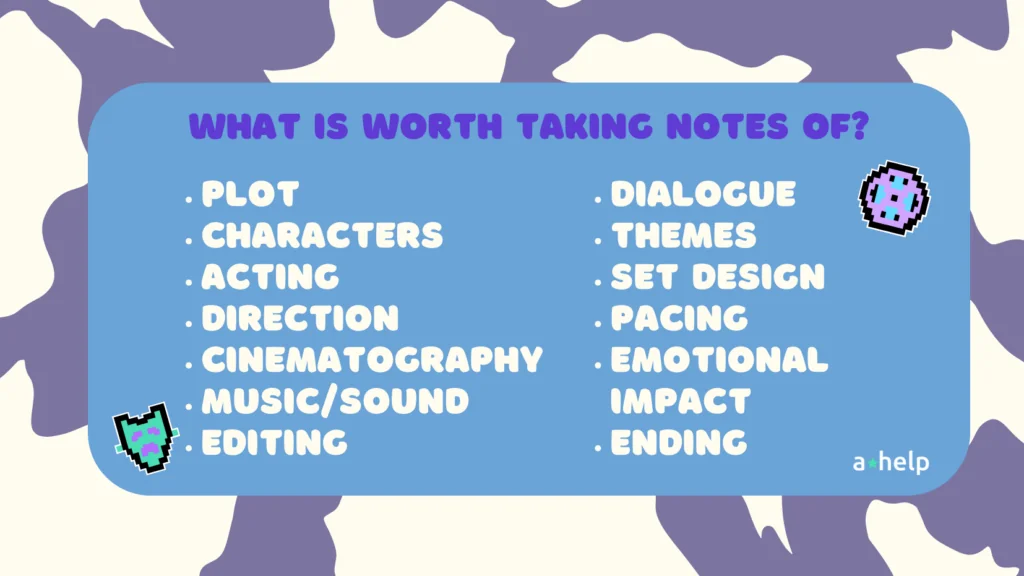
⏰ Watch the Film at Least Two Times
You will spend a lot of time viewing the movie and you have to deal with it sooner rather than later. There is no way a person can grasp all of the details in a single sitting. After finishing your watch the first time, you will have a much clearer idea of what is happening and how the character dynamic is changing, and you will have more capabilities to reflect on them and get to the conclusion.
Sometimes, your whole opinion of the movie can change after watching it the second time. This will make your film review much more nuanced and well-informed. Remember, that being thoroughly prepared is the only way to come up with a good opinion piece, so don’t hesitate to ‘waste’ an additional hour or two on it.
Writing a film review starts with a well-thought-out outline. This structure is key to making sure you don’t miss any important parts of the film. Here’s a TLDR for you, if you need it:
- 💡 Introduction
- 🎥 Plot summary
- ✍️ Evaluation
Begin with the introduction, where you briefly mention the film’s title, director, release year, and genre. Share your first impression to give readers a hint of what your review will be like. For example, mentioning the unique mix of horror and comedy in a film can make readers curious about how these elements work together.
Next in your outline is the plot summary. This part is a balancing act; you want to give enough information to interest your reader without giving away the movie’s surprises. Think of it as painting a picture in broad strokes – you show the journey without detailing every twist and turn.
The analysis is where your reviews really take shape. Focus on parts that stood out to you, like exceptional performances, the director’s distinct storytelling style, or the cinematography that brought the film’s world to life. This is also where you discuss how the film affected you and why. Did it challenge your views, or did it fail to deliver its message?
Finish your outline with a section for evaluation. Reflect on the film’s strengths and weaknesses. Also, don’t forget to consider its impact and any potential significance in its genre or the director’s collection of work. This is where your perspective shines through and offers a final judgment that helps readers decide if the film is worth their time.
How to Write a Film Review Introduction
Do you want the readers to go past the first paragraph? Create an engaging introduction. It’s important to express a clear opinion right from the start, so readers know what to expect. For example, saying, “ Director X’s latest film is a visual feast that reimagines the genre ,” immediately reveals your positive perspective.
Stating your opinion isn’t the only way to go. Adding quotes from the director, critics, or cast can also grab attention and add depth to your review. A carefully chosen quote can shed light on the film’s creative vision or stress a key theme. For instance, “ Director K said, ‘This film explores the depths of human emotion,’ which sums up the cinematic experience .”
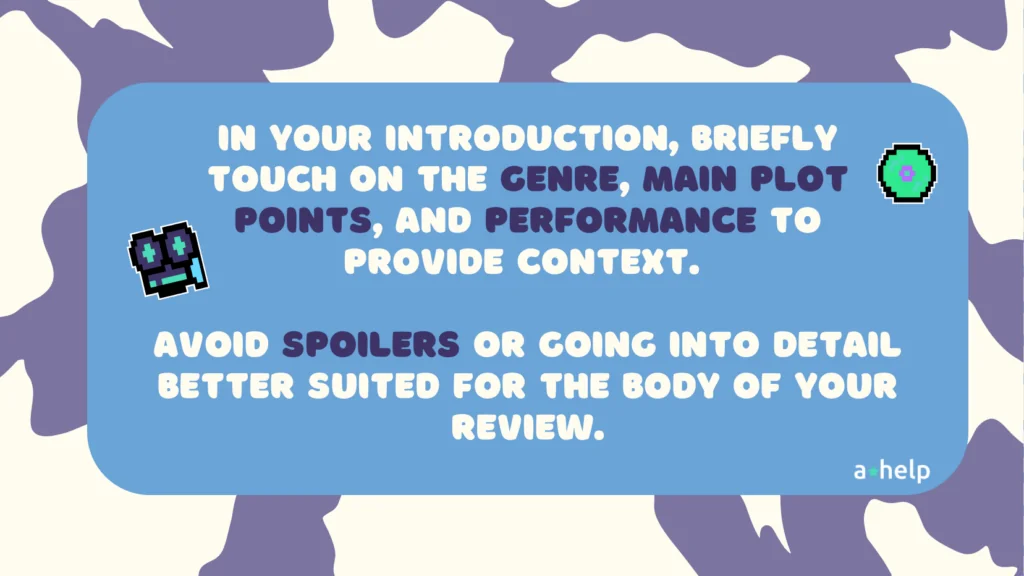
Your introduction should also give a hint of the unique angle or perspective you’ll bring to your reviews. Whether you’re examining the film’s cultural significance, technical achievements, influence on the masses, or narrative structure, giving readers a glimpse of your approach will keep them engaged.
Keep in mind that your goals should be striking a balance between being informative and captivating. You need to encourage readers to continue with your review, and there is no better way to do so than keeping your narrative “to the point” while also showing your enthusiasm for the film.
8 Tips on How to Review a Movie
Clearly, there is no perfect answer to the question of how to write a good movie review. However, apart from all of the things mentioned above, there are some tips left that we would like to share with you. If you feel like something is still missing or you want to polish your text even more, look through the following things.
Don’t Shy Away From Criticism
A good review is more than just stating whether you liked the film; it explains why. You should really dive into your analysis, and provide thematic insights into plot inconsistencies or weak character development if you see them. The point of the review is not to sugarcoat everything, but to highlight even the messiest parts. For example, rather than simply writing that the storyline was confusing, explain which exact plot points were unclear. This way, the readers will understand your perspective much better.
Add Specific Scene Examples
Make your review more vivid by citing particular scenes that stood out. Trust us, your review will be much more relatable if you discuss a specific tense moment or a beautifully shot sequence rather than just saying “It was nerve-racking.” These examples are proof of your critiques and help readers visualize your points. For example, you might mention a scene where the cinematography captured the emotional intensity and how much the film’s visual storytelling influenced your overall impression.
Think About Your Audience
Adapt your review to fit your readers’ interests and knowledge level. If you’re writing for a general audience, focus on aspects that will resonate with a wide range of viewers, such as the plot and character arcs. For more avid fans of cinema culture, you can explore technical aspects like the director’s style or the film’s score on Rotten Tomatoes. Knowing your audience will help you find the right tone and level of detail for your review, even if it is just part of your high school assignment.
Study the People Who Made the Film
A film is a collaborative effort involving many talented individuals: actors, composers, set designers, editors, and so on. Research the backgrounds of key figures and their journey in film, because understanding their past filmmaking work and artistic styles can provide context for your review and answer some of the questions you or your readers might have. For example, knowing the director’s preference for dark, psychological thrillers might explain some creative choices in the film. This research can improve your analysis and create a more complete view of the movie.
Edit, Edit, Edit
No text will succeed in its purpose without some retouching. Revisiting your work can help spot unclear ideas and sharpen your points if you missed anything. The final step is editing, so just fix grammatical mistakes and make your language more readable. There is not much to add; don’t skip over proofreading and be your own strict editor.
Highlight the Acting
We talked about so many things in this guide but didn’t give enough attention to what is seemingly the baseline of any movie – the acting. A film’s success often hinges on its actors, and paying homage to standout performances can be a highlight in your review. Whether it’s an actor’s skill in portraying deep emotions or their interaction with fellow cast members, these details add to the appeal of the text.
Don’t Forget the Film’s Pacing
The rhythm of a film is a very interesting part of it all since it can significantly affect the viewing experience. You can elaborate on your thoughts about it in the review and discuss if the film kept a consistent pace or felt hurried in places, which was not pleasant. If you don’t know where to start, you can mention if a gradual buildup led to a more rewarding ending or if the pace felt erratic and distracted you from the story’s flow.
Still, Provide a Balanced View
Even if you consider the director your nemesis because you didn’t like the film one bit, a fair review has to present a balanced critique. It is still important to recognize its strengths and good moments. You can even provide some advice where you can. Similarly, if you absolutely loved the film, highlighting any weaknesses or areas adds credibility to your review. This balance builds trust with your readers and shows that your review is well-thought-out and not rushed.
Wrapping Up
Phew, we think that’s it! Learning how to write a movie critique takes time and, most importantly, practice. It’s okay if it doesn’t come out great the first time, you just have to keep trying. Filmmaking strings the hearts of many, and your review can be a part of that conversation. Read through the tips above, take pride in your work, and always strive for the best!
How do you write a film review example?
To write a film review, start with an introduction that includes the film’s title, director, and a brief overview. Then, summarize the plot without revealing spoilers. Analyze key elements like acting, direction, and cinematography. Offer your evaluation, highlighting the film’s strengths and weaknesses. Conclude with a recommendation for the audience.
What are the 6 important things to include a film review?
The six important things to include in a film review are: an introduction with basic film information, a plot summary, analysis of key elements (acting, direction, cinematography), your evaluation of the film, a conclusion with your recommendation, and consideration of the target audience.
How should you start a movie review?
Start a movie review with an engaging introduction that provides essential information about the film, such as its title, director, and genre. You can also include a hook, such as a thought-provoking question or a bold statement, to grab the reader’s attention.
What is a catchy phrase for a movie review?
A catchy phrase for a movie review could be “A cinematic masterpiece that takes your breath away” or “An emotional rollercoaster from start to finish.” The phrase should capture the essence of the film and entice readers to learn more.
How do you write a movie summary?
To write a movie summary, briefly describe the main plot, focusing on the key events and characters. Keep it concise and avoid revealing spoilers. The summary should give readers a clear idea of the film’s storyline without giving away too much detail.
What is the format of a review essay?
The format of a review essay typically includes an introduction with the subject of the review, a summary of the content being reviewed, an analysis of the key points, an evaluation of the strengths and weaknesses, and a conclusion that summarizes the review and provides a final assessment.
How many pages should a movie review be?
A film review is normally about two to three pages long (400-700 words), so a simple outline of the story and a sentence or two about the general setting in which it takes place will be more than enough. It is your opinion and the detailed analysis of the film components that must be the main focus of your review.
Follow us on Reddit for more insights and updates.
Comments (0)
Welcome to A*Help comments!
We’re all about debate and discussion at A*Help.
We value the diverse opinions of users, so you may find points of view that you don’t agree with. And that’s cool. However, there are certain things we’re not OK with: attempts to manipulate our data in any way, for example, or the posting of discriminative, offensive, hateful, or disparaging material.
Cancel reply
Your email address will not be published. Required fields are marked *
Save my name, email, and website in this browser for the next time I comment.
More from Writing a Review
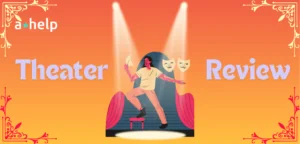
Nov 06 2015
How to Write a Play Review
Nov 24 2014
Writing a Music Review
Mar 07 2012
Writing Poetry Analysis
Remember Me
Is English your native language ? Yes No
What is your profession ? Student Teacher Writer Other
Forgotten Password?
Username or Email
How to Write an Academic Movie Review
Doug hewitt.

A general movie review can have elements of the writer’s personal tastes when describing the entertainment value of the movie. However, when the movie review is an academic review, the subject of the review is not entertainment value. While an academic movie review can touch on several subjects, the main thrust is describing the elements of the movie and how these elements tie into the movie’s theme.
Write an introductory paragraph that lists the name of the movie and the director. Provide your thesis statement, which is a statement that reflects what the movie was about and how the director attempted to portray the theme. You may have to view the movie several times in order to understand the deeper meanings of some of the film’s symbolism. Use a notebook and pen to take notes during the movie.
Discuss different elements of the film and how these elements provide evidence that supports your thesis statement. Some of the elements that can be discussed are plot development, tone, setting and cinematography. For example, if the director uses a lot of close-up shots, she may be stressing personal decision-making.
Add background research to support your thesis statement. The movie should be discussed in the context of the director’s overall work. This may involve a discussion of world events, because movies often reflect social issues of the day. For example, the subject of the Civil War should be discussed in an academic movie review of “Gone With The Wind.”
Summarize the points that you raised in your review and how all of them support your thesis statement. End the report by restating your thesis statement.
Add a bibliography if you used any research material in writing your academic movie review.
Proofread your work.
- 1 Dartmouth Writing Program: What Is an Academic Paper?
About the Author
Doug Hewitt has been writing for over 20 years and has a Master of Arts from University of North Carolina-Greensboro. He authored the book "The Practical Guide to Weekend Parenting," which includes health and fitness hints for parents. He and his wife, Robin, are coauthors of the "Free College Resource Book."
Related Articles

How to Write a Sociological Movie Review

How to Write a Critical Review of a Movie in APA

Film Topics for Research Papers

How to Write a Film Analysis Essay

How to Write a Movie Response Essay

How to Write a Restaurant Review

Ideas for Evaluation Essays

How to Write a College Book Analysis

Theater Research Paper Topics

How Good of a Friend is Your BFF?

Photography Research Paper Topics

How to Write a Book Summary for 5th Graders

Ideas for Literary Analysis Research Papers

How to Put an iMovie on Facebook

Theme Ideas for High School Reunion

How to Write an Essay for a Single Photograph

How to Write an Ending Paragraph in an Essay

Where to Donate WWII Photos

How Did the Harlem Renaissance Impact American Culture?

How to Make a Black Screen With Text in Final Cut Express
Regardless of how old we are, we never stop learning. Classroom is the educational resource for people of all ages. Whether you’re studying times tables or applying to college, Classroom has the answers.
- Accessibility
- Terms of Use
- Privacy Policy
- Copyright Policy
- Manage Preferences
© 2020 Leaf Group Ltd. / Leaf Group Media, All Rights Reserved. Based on the Word Net lexical database for the English Language. See disclaimer .
- 1-800-611-FILM
How to Write a Movie Review: 10 Essential Tips
As long as there have been films, there have been film critics. Starting with the early days of cinema, where reviews appeared in newspapers and magazines as brief, descriptive pieces, as filmmaking evolved as an art form, so did the role of the critic. James Agee, André Bazin, and Pauline Kael shaped the discourse around cinema, and today, famous film critics like the iconic Roger Ebert , The New York Times’s A.O. Scott , and The New York Times’s Manohla Dargis continue to leave an indelible mark on the world of cinema.
With the rise of the internet, film criticism now encompasses a wide range of voices and perspectives from around the globe. Sites like Letterboxd make it possible for anyone to write short-form reviews on film. Even stars like The Bear’s Ayo Edebiri have accounts and share opinions on the latest box-office hits.
How to Write a Movie Review
Today, contemporary YouTube and TikTok critics such as Red Letter Media , deepfocuslens , and DoMo Draper don’t just write film reviews, they shoot videos and skits. Through their creative formats, they offer refreshing and unique perspectives while building communities of diehard film and television enthusiasts. Whether you choose to write reviews for your own blog, other websites, or social media channels, by learning how to write a movie review, any aspiring filmmaker can start to watch films intentionally.
@domodraperr Replying to @xsindeviltriggerx I’ll get right on that, Sir!🫡 #comments #movies #film #satire #fyp #mulan #disney ♬ I’ll Make a Man Out of You (feat. Black Gryph0n) – Cover – Samuel Kim
TikTok film critic “DoMo Draper” provides commentary on new and old films, often calling out racism, social injustice, misogyny, and prejudice.
While there’s no perfect approach to writing a review, there are best practices that every aspiring reviewer should consider.
Here are ten tips on writing a compelling piece.
1. Watch the film at least once.
For new reviewers, it’s impossible to capture everything after one viewing. Watching the film first, then watching to take notes, is an easy way to improve the quality of your final review. This will also make it easy to recall in-the-moment thoughts and reactions.
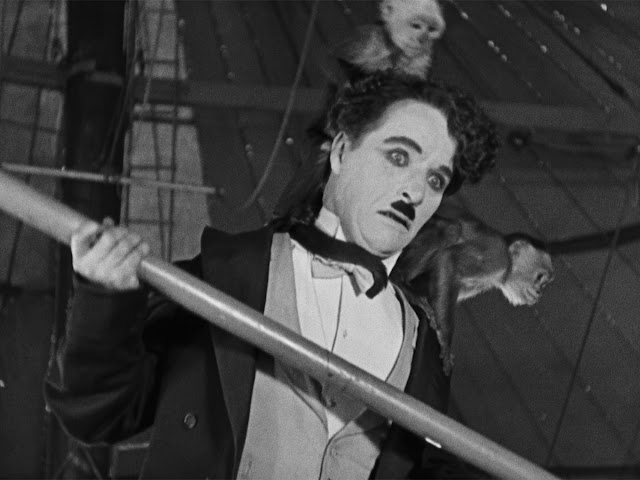
Take a review by Christian Blauvelt of Charlie Chaplin’s silent film The Circus , for example. Since the film does not have sound, properly critiquing the film requires close attention. Viewers have to pay attention to the various nuances in Chaplin’s performance, follow the story, and take in the cinematography. Regarding The Circus , Blauvelt writes, “The film lacks a conventional plot, but is rather a pearl necklace of strung-together episodes. ” The statement isn’t a criticism, but a keen observation likely gleaned from more than one viewing.
So while every film reviewer has their own approach, many choose to watch a film more than once to deliver the best possible review. Image The Criterion Collection.
2. Express your opinions and support your criticism.
Professional reviewers do not shy away from sharing whether they thought a movie was good, bad, or indifferent. In a review for the film Mother!, reviewer Candice Frederick describes the film as “uncomfortable,” and “controversial,” helping viewers understand the tone of the movie. While Frederick seemed to enjoy the film, her honesty about how it would make audiences feel was vital in writing the review.
Be sure to back up these thoughts with specifics–a disappointing performance, beautiful cinematography, difficult material that leaves you thinking, and so on. Professional reviewers should express why and how they came to their criticism.
3. Consider your audience.
Are you writing for a fan site or a news outlet? Who will read your pieces, and what are their interests? Knowing who your readers are and where the review will be published can help you decide what elements of the movie to highlight. For example, take these two very different reviews for the film ‘Synecdoche, New York’.
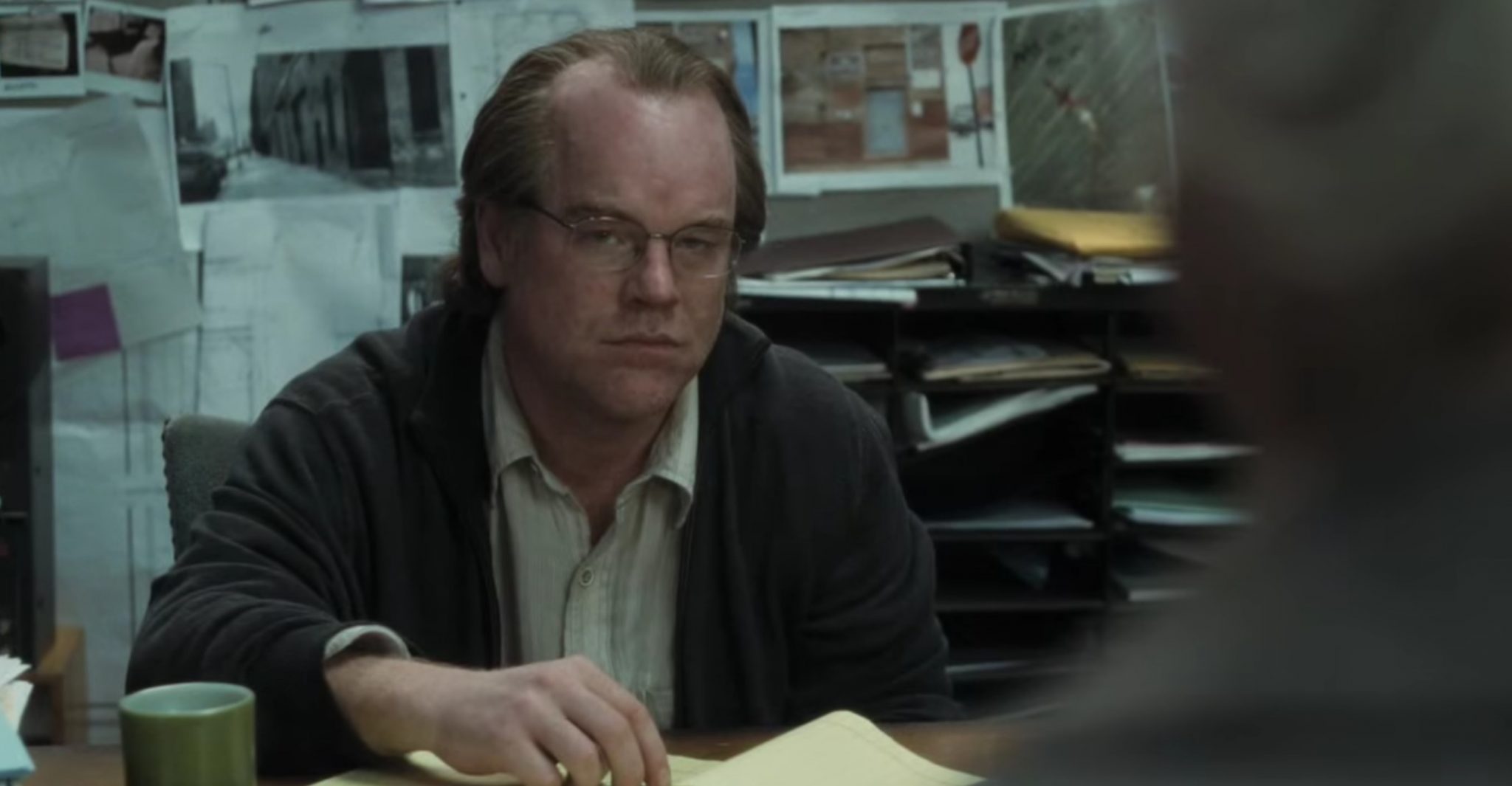
The first review was written by Alonso Duralde for The Today Show , and clocks in at around 500 words. The film focuses on the bullet points: characters, plot, and a concise review. The second review is over 3,000 words and published on the Critical Critics blog . This review goes into massive depth (and yes, includes spoilers) about the film, providing an incredible amount of analysis. The first review is tailored for the casual filmgoer, while the second is for cinephiles. Each review serves a different purpose.
It’s also a good idea to adjust your writing style to fit the target audience. For example, Alonso Duralde is a talented film reviewer and likely wrote the review to fit the tone of The Today Show site. Image via Director’s Library.
4. Talk about the acting.
When reviewing a film, it’s important to take space to discuss the performances. Does the film feature a seasoned actor in a new kind of role or a brilliant performance from a rising star? How was the acting? In a review by Brett Milam for the award-winning film Whiplash , he goes into rich detail about performances by both breakthrough actor Miles Teller and seasoned professional JK Simmons.
Regarding Teller, Milam writes, “This is a performance. This is art,” and about Simmons, “I found him fascinating to just look at.” Those are just small examples of the analysis he provides regarding their acting. As the film mostly focuses on the relationship between their two characters, Miles as the protagonist and JK as the antagonist, the review of the performances lends well to the plot of the film: student and teacher going head to head in an intense and determined showdown.
Feedback about how well the actors handled the script, the dynamics in an ensemble, and so much more can help describe how the actors did in any given film.
5. Call out directors, cinematographers, and special effects.
Reviews that include highlights or missteps of directors, cinematographers, and costume designers can help provide support to your critiques. By providing specific examples of what worked, what surprised you, and what fell short of expectations, reviewers can write a well-thought-out review that goes beyond whether or not you liked it.

In a review for A Wrinkle in Time , Monique Jones artfully crafts a piece that diplomatically cites the missteps of the film. From analyzing the quality of the CGI to the camera techniques to inconsistencies in the rules of the fantasy universe, Jones fairly offers a critique that guides the filmmakers and crew on future endeavors. To write this type of review, it helps to have some knowledge of the filmmaking process so you can properly assess the screenwriting, cinematography, special effects, acting, and more. Image via Disney.
6. No spoilers!
The point of writing a movie review is to get people interested in seeing a movie. That’s why it’s absolutely best practice to not reveal spoilers in a film review. Film reviewer Robert Daniels approaches this creatively. In his review of Annihilation , he provides commentary on what would be considered spoilers. However, he places that part of the review at the bottom of the article under a bold header/image that warns the reader he’s about to spoil the film. For reviewers who want to dissect the entire film, this is a good way to both tease the film for anyone who hasn’t seen it and cater to people who want to know what the ending is.
Remember: the goal of any film review is to discuss the plot without revealing any twists or the ending of the film.
7. Study the professionals.
As with all writing endeavors, the more you read, the better. However, with the modern landscape of film reviewing, which can go beyond writing and extend to content creation for social media platforms, there are a ton of reviewers to take notes from. First, determine what kind of reviewer you want to be, and what kind of medium you plan to deliver your reviews on. If you plan to post to Medium, for example, studying the reviewers already established on the site can be a great starting point.
Then, read film reviews for some of your favorite films. Determine which style of review you like and don’t like. Question why, and use your critical eye to consider why one reviewer has a hundred thousand followers and another only has two. If you’re looking to be featured on a website or a magazine, read the publications where you’d like your writing to appear as a template for your reviews, and don’t forget to read the submission guidelines. A few examples of film review professionals include Rotten Tomatoes , Roger Ebert , and Film Comment.
8. Reread, rewrite, and edit.
While writing film critique is based on opinion, and follows the style of the reviewer, it’s still important to edit work. Writers should check for spelling, grammar, and readability. No matter how good a writer’s opinions are, they will not be taken seriously if the director’s name isn’t spelled correctly. Tools such as Grammarly and Hemingway Editor can be great for correcting and finding areas that need improvement.
9. Find your voice.
The best reviewers have a distinct personality that comes across in their writing. Los Angeles Times film reviewer Carlos Aguilar wrote an impassioned piece about the film Beatriz at Dinner , going into a lot of detail about his experiences working in the film industry and his Mexican heritage. By sharing anecdotes about casual racism he’s experienced and connecting it to the film’s protagonist, and what she goes through, the review feels personal and relatable.

“If at a film festival – to which I’ve gotten access to because I’m a published writer – in a progressive city like Los Angeles, I must keep my guard up when people question my right to be there, then how are the voiceless supposed to feel safe, respected, or hopeful?” Aguilar writes.
For new reviewers, developing this type of unique voice does not happen overnight, so take every opportunity to write as an opportunity to develop your style. Image via BBC.
10. Know your taste.
As a film reviewer, it can be helpful to identify your taste in film. By knowing specific preferences, strengths, and biases, reviewers can offer nuanced critiques that resonate with audiences and provide valuable guidance on which films they might enjoy. Additionally, it helps to maintain credibility and integrity as a reviewer by ensuring that assessments are authentic and reflective of personal cinematic sensibilities.
Try to explore various genres, directors, and themes to understand what resonates emotionally, intellectually, and aesthetically. Pay attention to the types of stories that engage you, which can help define your preferences.
Learn More About Filmmaking at NYFA
Film students with writing experience actually make great reviewers, as many of them are required to study a range of topics relating to film that can include cinematography, screenwriting, producing, and much more. Ready to build even more skills in filmmaking? Request more information about New York Film Academy’s filmmaking programs and workshops today!
- PRO Courses Guides New Tech Help Pro Expert Videos About wikiHow Pro Upgrade Sign In
- EDIT Edit this Article
- EXPLORE Tech Help Pro About Us Random Article Quizzes Request a New Article Community Dashboard This Or That Game Popular Categories Arts and Entertainment Artwork Books Movies Computers and Electronics Computers Phone Skills Technology Hacks Health Men's Health Mental Health Women's Health Relationships Dating Love Relationship Issues Hobbies and Crafts Crafts Drawing Games Education & Communication Communication Skills Personal Development Studying Personal Care and Style Fashion Hair Care Personal Hygiene Youth Personal Care School Stuff Dating All Categories Arts and Entertainment Finance and Business Home and Garden Relationship Quizzes Cars & Other Vehicles Food and Entertaining Personal Care and Style Sports and Fitness Computers and Electronics Health Pets and Animals Travel Education & Communication Hobbies and Crafts Philosophy and Religion Work World Family Life Holidays and Traditions Relationships Youth
- Browse Articles
- Learn Something New
- Quizzes Hot
- This Or That Game
- Train Your Brain
- Explore More
- Support wikiHow
- About wikiHow
- Log in / Sign up
- Arts and Entertainment
- Film Studies
How to Write a Movie Review
Last Updated: May 13, 2024 Fact Checked
This article was co-authored by Marissa Levis . Marissa Levis is an English Teacher in the Morris County Vocational School District. She previously worked as an English director at a tutoring center that caters to students in elementary and middle school. She is an expert in creating a curriculum that helps students advance their skills in secondary-level English, focusing on MLA formatting, reading comprehension, writing skills, editing and proofreading, literary analysis, standardized test preparation, and journalism topics. Marissa received her Master of Arts in Teaching from Fairleigh Dickinson University. There are 14 references cited in this article, which can be found at the bottom of the page. This article has been fact-checked, ensuring the accuracy of any cited facts and confirming the authority of its sources. This article has been viewed 5,622,503 times.
Whether a movie is a rotten tomato or a brilliant work of art, if people are watching it, it's worth critiquing. A decent movie review should entertain, persuade and inform, providing an original opinion without giving away too much of the plot. A great movie review can be a work of art in its own right. Read on to learn how to analyze a movie like a professional film critic, come up with an interesting thesis, and write a review as entertaining as your source material.
Sample Movie Reviews

Writing an Intro for a Movie Review

- Comparison to Relevant Event or Movie: "Every day, our leaders, politicians, and pundits call for "revenge"– against terrorist groups, against international rivals, against other political parties. But few of them understand the cold, destructive, and ultimately hollow thrill of revenge as well as the characters of Blue Ruin. "
- Review in a nutshell: "Despite a compelling lead performance by Tom Hanks and a great soundtrack, Forrest Gump never gets out of the shadow of its weak plot and questionable premise."
- Context or Background Information: " Boyhood might be the first movie made where knowing how it was produced–slowly, over 12 years, with the same actors–is just as crucial as the movie itself."

- Using stars, a score out of 10 or 100, or the simple thumbs-up and thumbs-down is a quick way to give your thoughts. You then write about why you chose that rating.
- Great Movie: ABC is the rare movie that succeeds on almost every level, where each character, scene, costume, and joke firing on all cylinders to make a film worth repeated viewings."
- Bad Movie: "It doesn't matter how much you enjoy kung-fu and karate films: with 47 Ronin, you're better off saving your money, your popcorn, and time."
- Okay Movie: "I loved the wildly uneven Interstellar far more than I should have, but that doesn't mean it is perfect. Ultimately, the utter awe and spectacle of space swept me through the admittedly heavy-handed plotting and dialogue."

- Great: "Michael B. Jordan and Octavia Spencer's chemistry would carry Fruitvale Station even if the script wasn't as good. The mid-movie prison scene in particular, where the camera never leaves their faces, shows how much they can convey with nothing but their eyelids, the flashing tension of neck muscles, and a barely cracking voice."
- Bad: " Jurassic World's biggest flaw, a complete lack of relatable female characters, is only further underscored by a laughably unrealistic shot of our heroine running away from a dinosaur – in heels."
- Okay: "At the end of the day, Snowpiercer can't decide what kind of movie it wants to be. The attention to detail in fight scenes, where every weapon, lightbulb, and slick patch of ground is accounted for, doesn't translate to an ending that seems powerful but ultimately says little of substance."

- Does the film reflect on a current event or contemporary issue? It could be the director's way of engaging in a bigger conversation. Look for ways to relate the content of the film to the "real" world.
- Does the film seem to have a message, or does it attempt to elicit a specific response or emotion from the audience? You could discuss whether or not it achieves its own goals.
- Does the film connect with you on a personal level? You could write a review stemming from your own feelings and weave in some personal stories to make it interesting for your readers.
Composing Your Review

- When you name characters in your plot summary, list the actors' names directly afterward in parenthesis.
- Find a place to mention the director's name and the full movie title.
- If you feel you must discuss information that might "spoil" things for readers, warn them first.

- Cinematography: " Her is a world drenched in color, using bright, soft reds and oranges alongside calming whites and grays that both build, and slowly strip away, the feelings of love between the protagonists. Every frame feels like a painting worth sitting in."
- Tone: "Despite the insane loneliness and high stakes of being stuck alone on Mars, The Martian's witty script keeps humor and excitement alive in every scene. Space may be dangerous and scary, but the joy of scientific discovery is intoxicating."
- Music and Sound: " No Country For Old Men's bold decision to skip music entirely pays off in spades. The eerie silence of the desert, punctuated by the brief spells of violent, up-close-and-personal sound effects of hunter and hunted, keeps you constantly on the edge of your seat."
- Acting: "While he's fantastic whenever he's on the move, using his cool stoicism to counteract the rampaging bus, Keanu Reeves can't quite match his costar in the quiet moments of Speed, which falter under his expressionless gaze."

- Keep your writing clear and easy to understand. Don't use too much technical filmmaking jargon, and make your language crisp and accessible.
- Present both the facts and your opinion. For example, you might state something such as, "The Baroque background music was a jarring contrast to the 20th century setting." This is a lot more informative then simply saying, "The music was a strange choice for the movie."

- Great: "In the end, even the characters of Blue Ruin know how pointless their feud is. But revenge, much like every taut minute of this thriller, is far too addictive to give up until the bitter end.""
- Bad: "Much like the oft-mentioned "box of chocolates", Forest Gump has a couple of good little morsels. But most of the scenes, too sweet by half, should have been in the trash long before this movie was put out."
- Okay: "Without the novel, even revolutionary concept, Boyhood may not be a great movie. It might not even be "good.” But the power the film finds in the beauty of passing time and little, inconsequential moments – moments that could only be captured over 12 years of shooting – make Linklater's latest an essential film for anyone interested in the art of film."
Polishing Your Piece

- Ask yourself whether your review stayed true to your thesis. Did your conclusion tie back in with the initial ideas you proposed?
- Decide whether your review contains enough details about the movie. You may need to go back and add more description here and there to give readers a better sense of what the movie's about.
- Decide whether your review is interesting enough as a stand-alone piece of writing. Did you contribute something original to this discussion? What will readers gain from reading your review that they couldn't from simply watching the movie?

Studying Your Source Material

- The title of the film, and the year it came out.
- The director's name.
- The names of the lead actors.

- Make a note every time something sticks out to you, whether it's good or bad. This could be costuming, makeup, set design, music, etc. Think about how this detail relates to the rest of the movie and what it means in the context of your review.
- Take note of patterns you begin to notice as the movie unfolds.
- Use the pause button frequently so you make sure not to miss anything, and rewind as necessary.

- Direction: Consider the director and how he or she choose to portray/explain the events in the story. If the movie was slow, or didn't include things you thought were necessary, you can attribute this to the director. If you've seen other movies directed by the same person, compare them and determine which you like the most.
- Cinematography: What techniques were used to film the movie? What setting and background elements helped to create a certain tone?
- Writing: Evaluate the script, including dialogue and characterization. Did you feel like the plot was inventive and unpredictable or boring and weak? Did the characters' words seem credible to you?
- Editing: Was the movie choppy or did it flow smoothly from scene to scene? Did they incorporate a montage to help build the story? And was this obstructive to the narrative or did it help it? Did they use long cuts to help accentuate an actor's acting ability or many reaction shots to show a group's reaction to an event or dialogue? If visual effects were used were the plates well-chosen and were the composited effects part of a seamless experience? (Whether the effects looked realistic or not is not the jurisdiction of an editor, however, they do choose the footage to be sent off to the compositors, so this could still affect the film.)
- Costume design: Did the clothing choices fit the style of the movie? Did they contribute to the overall tone, rather than digressing from it?
- Set design: Consider how the setting of the film influenced its other elements. Did it add or subtract from the experience for you? If the movie was filmed in a real place, was this location well-chosen?
- Score or soundtrack: Did it work with the scenes? Was it over/under-used? Was it suspenseful? Amusing? Irritating? A soundtrack can make or break a movie, especially if the songs have a particular message or meaning to them.

Expert Q&A

- If you don't like the movie, don't be abusive and mean. If possible, avoid watching the movies that you would surely hate. Thanks Helpful 0 Not Helpful 0
- Understand that just because the movie isn't to your taste, that doesn't mean you should give it a bad review. A good reviewer helps people find movie's they will like. Since you don't have the same taste in movies as everyone else, you need to be able to tell people if they will enjoy the movie, even if you didn't. Thanks Helpful 0 Not Helpful 0
- Structure is very important; try categorizing the different parts of the film and commenting on each of those individually. Deciding how good each thing is will help you come to a more accurate conclusion. For example, things like acting, special effects, cinematography, think about how good each of those are. Thanks Helpful 0 Not Helpful 0

You Might Also Like

Expert Interview

Thanks for reading our article! If you’d like to learn more about writing, check out our in-depth interview with Marissa Levis .
- ↑ https://owl.purdue.edu/owl/subject_specific_writing/writing_in_literature/writing_about_film/terminology_and_starting_prompts.html
- ↑ https://www.spiritofbaraka.com/how-write-a-movie-review
- ↑ https://www.nyfa.edu/student-resources/9-tips-for-writing-a-film-review/
- ↑ https://en.oxforddictionaries.com/writing-help/top-tips-for-writing-a-review
- ↑ https://writingcenter.unc.edu/tips-and-tools/summary-using-it-wisely/
- ↑ https://twp.duke.edu/sites/twp.duke.edu/files/file-attachments/film-review-1.original.pdf
- ↑ https://www.dailywritingtips.com/7-tips-for-writing-a-film-review/
- ↑ https://owl.purdue.edu/owl/subject_specific_writing/writing_in_literature/writing_about_film/film_writing_sample_analysis.html
- ↑ https://learning.hccs.edu/faculty/onnyx.bei/dual-credit/movie-review-writing-guide
- ↑ https://writingcenter.unc.edu/tips-and-tools/conclusions/
- ↑ https://www.grammarly.com/blog/how-to-write-a-movie-review/
- ↑ https://gustavus.edu/writingcenter/handoutdocs/editing_proofreading.php
- ↑ https://writingcenter.unc.edu/tips-and-tools/editing-and-proofreading/
- ↑ https://edusson.com/blog/how-to-write-movie-review
About This Article

To write a movie review, start with a compelling fact or opinion to hook your readers, like "Despite a great performance by Tom Hanks, Forrest Gump never overcomes its weak plot." Then, elaborate on your opinion of the movie right off the bat so readers know where you stand. Once your opinion is clear, provide examples from the movie that prove your point, like specific scenes, dialogue, songs, or camera shots. To learn how to study a film closely before you write a review, scroll down! Did this summary help you? Yes No
- Send fan mail to authors
Reader Success Stories
Did this article help you?

Breanna Lukes
Oct 17, 2018
Mar 31, 2021
Jun 29, 2023
Kothyn Evans-Alexander
Nov 28, 2018

Featured Articles

Trending Articles

Watch Articles

- Terms of Use
- Privacy Policy
- Do Not Sell or Share My Info
- Not Selling Info
wikiHow Tech Help Pro:
Develop the tech skills you need for work and life
How to Write a Movie Review and Where to Get Help
The first thing you do after watching a movie is to go online and write a comment about it. Comments about movies are usually posted on social media profiles or public pages, review sites, blogs, among other platforms. You can make the process easier with tools available online.
Writing a movie review is a common assignment that students have to do in high school and college. Even though it may seem simple, movie reviews require time and proper organization. It’s not just about writing what happens on the screen, the review goes deeper than that.
Movie Review Purpose
The main purpose of a movie review is to inform the reader about the film and its ideas. Seems simple, right? Reporting all events that happen and stating one’s opinion about them is a common mistake that many students make. While movie review allows writers to express their opinions about some film or documentary, there is also the need for the unbiased and objective approach. An ideal review combines both.
The review determines whether someone will want to see the movie. Even if the professor (or teacher) assigned a specific title and film to review, one should act like this is the perfect opportunity to introduce the cinematography work to their lecturer. Always assume they haven’t seen it before. As a result, it becomes easier to analyze events that happened on the screen.
Film review should be detailed enough to provide assistance in making an honest decision i.e. whether the reader wants to see it or if they’d like it. Why is this type of paper a common school assignment? Lecturers want to get more insight into a student’s critical thinking skills and the ability to report event (one or more of them) in a manner that others understand easily.
In addition, they want to assess the way you analyze plot and characters. After all, movie reviews also involve the analysis of events that happened in a documentary or “regular” film. Reviews test writing and vocabulary skills, adapting to different genres and events they portray, and your capacity to sum up some major work and report it in a cohesive, logical, and interesting manner.
While reviews entail more responsibility than initially thought, students find them fun and with this guide, you will too.

How to Write a Good Movie Review
You have to write a movie review for school and now what? Where to start, how to make it look more “academic”? Today, we have the opportunity to use numerous tools to make every part of our lives easier, and movie review writing isn’t the exception. Throughout this tutorial, you’ll learn how to compose a report about some film and what tools to use to simplify the process.
Step-by-Step Guide to How to Write a Movie Review
Beginnings are always the hardest. This is the point where you set the pace and determine how to approach this assignment in the most efficient manner. Here are some useful tips to kick-start the movie review writing process:
- Watch the movie or documentary twice and take notes of both major and minor events and characters. It’s a mistake to rely on the power of your memory only, there’s always something we overlook or forget
- Carry out a thorough research . Watching the movie isn’t enough, research is equally important. Look for details such as the name of filmmaker and his/her motivation to make that film or documentary work, locations, plot, characterization, historic events that served as an inspiration for the movie (if applicable). Basically, your research should serve to collect information that provides more depth to the review
- Analyze the movie after you watching it . Don’t start working on the review if you aren’t sure you understand the film. Evaluate the movie from beginning to an end. Re-watch it, if necessary, if you find some parts confusing. Only when you understand events that happened on the screen will you find it easier to create the review
- Draft an outline that you will follow to write the review in a concise and cohesive fashion
- Include examples for claims you make about the movie. If the plot has holes, then mention an example of a situation or scene when that was evident. Also, if the character(s) is poorly developed or bad casting affected the movie quality, name examples too. Provide examples when commenting dialogues, locations, plot, everything. If you want the reader to agree with you, it’s essential to back up your claims with evidence. You don’t want to make it seem like you’re praising or criticizing the movie without any reason whatsoever
- Consider and comment a movie’s originality and quality of scenes . Explain how the movie stands out or whether it just uses the same approach that worked for previous works in the industry
How to Organize Your Movie Review
Quality of your paper depends on the level of organization you implement. Never underestimate the importance of well-structured outline, regardless of the type of paper you have to write. Outlines help you focus on the subject and contribute to a logical flow.
In addition, getting things organized before you start writing is a great way to save time later on. Instead of trying to figure out what to include, you’ll have a well-structured plan to follow. It’s needless to mention you won’t be too stressed out. Here’s how to organize your movie review:
- Introduction (with title, release date, background information)
- Summary of the story
- Analysis of the plot elements (rising action, climax)
- Creative elements (dialogues, characters, use of colors, camera techniques, mood, tone, symbols, costumes or anything that contributes or takes away from the overall plot)
- Opinion (supported with examples and facts from the story)
- Conclusion (announcing whether the filmmaker was successful in his/her purpose, re-state your evidence, explain how the motion picture was helpful for providing a deeper understand of course topic)
Movie Review Elements
- The title of the film/documentary – just because your headline features the name of the movie or documentary it doesn’t mean should skip mentioning it in the text. Always name the feature you’ve watched in the introductory paragraph. This may seem like a stupid thing to point out, but it’s one of the most common mistakes that students make
- Summary – the whole point of the review is to summarize the documentary or movie for people who haven’t watched it yet. To make this as effective as possible, always assume that your professor hasn’t seen it either (as mentioned above). Why is this important? You won’t leave out some important details thinking he/she watched it already so they won’t bother. As a reviewer, your job is to explain what happened in the film and express whether the filmmaker failed or succeeded. Again, saying you liked or disliked it isn’t a viable comment. Your opinion has to be supported by specific reasons and examples from the feature itself
- Filmmaker – do a little research on the person who directed the piece. Is that person a controversial figure? Is he/she known for a political stance? Does the filmmaker have a significant background? Devote a paragraph or two to the person behind the movie and their other works in order to establish the significance of the film you are reviewing for the director’s career
- Significance to your class – How does the content of the documentary or film fit into your course topic? Is it important for historical accuracy? If you are watching the motion picture for history class, make note of over-dramatization. If the motion picture is based on the book you’ve analyzed in English class, you can mention similarities, differences, or some elements that film contains, but book doesn’t and so on
- Creative elements – filmmakers work hard to include creative elements into their motion pictures. How are these elements important to the plot and movie in general? For example, costumes can either enhance the movie or betray its intent. Colors can be vivid and lift the atmosphere or mood in the movie or they can be dull and make it seem depressing. Good sound effects enrich the viewing experience while bad ones only destroy everything. Moreover, camera movements and angles also add elements to the story. Take notes of symbols in the story, if any.
- Actors – let’s not forget the casting! Were the actors realistic? Did they portray the role of a specific character successfully? Did they have good acting skills? Do you believe that some particular actor was the right fit for the role?
Checklist / Outline for a Good Movie Review
- Introduction (title, topic, release date, background information)
- Accuracy of depiction
- Use of sources in the documentary
- Creative elements that enhance or tarnish the overall story (quality of script, visual design, performance, lighting, hair, and makeup, costume, set design, symbolism)
- Your opinion
Mistakes to Avoid
- Not focusing on the film – while connecting the plot to some specific historical event is a good idea (when applicable), strive to avoid writing about unnecessary details or introducing irrelevant information such as the history of cinematography or that particular genre, snacks, among other things
- Inserting yourself – you’re the one who’s writing the review. The paper reflects your understanding and opinion of the motion picture you’ve seen and there is no need to write in first person all the time: I noticed this, I saw that I liked this, I disliked that
- Failing to check facts about movie background and release date, director, casting etc.
- Giving out your opinion without mentioning any reason why you think that way
- Talking about irrelevancies
- Writing a review without a structure
- Writing generalities such as great acting, cool effects, a good movie, it was bad etc.
- Writing a review without substance or analysis of the feature

Finished papers
Customer reviews

Movie Review Examples
- The Hunger Games and the idea of dystopia
- Mean Girls review: does it exploit stereotypes about high schools or it helps to undermine them?
- The Martian review and its connection to Daniel Defoe’s Robinson Crusoe
- The Last Jedi review: all the reasons it’s far from the original saga
- Manchester by the sea and ideas of forgiveness and grief
- Forrest Gump review
- I am Sam review
- Runaway Bride review and its role in modern understanding of marriage
Movie Review Help
Like other types of writing, movie reviews require patience and time. Being a student isn’t the easiest task in the world and you don’t have enough time to dedicate to one assignment only while neglecting others. There’s no need to despair; you can use the internet to get much-needed assistance with this assignment. Here’s how:
By Markers Expectations / Rubrics
Clear Organization – as stated above, the clear organization is vital for a well-structured movie review. You can use the Edusson website as a guide through this process via numerous posts about writing, self-help resources, and Essay Examples that serves as an excellent platform to sharpen writing skills and compose your paper.
RobotDon Essay Checker platform proves to be handy when you complete the writing process and want to make sure it’s unique, without fluff and wateriness, repetitive words and expressions.
Let’s not fort that you can hire an essay writer who will write a perfect review for you.
Use of Sources – just because it’s movie review, it doesn’t mean you should avoid using sources to support your claims. Sources are particularly important for reviews of documentaries or when you’re trying to connect the review with some problem in society. Research requires more time than any other part of the process and you can easily hire a professional i.e. a helper who will do that for you
Opinion – a movie review is about the equilibrium of unbiased report and personal opinion. While it’s okay to say what you think about the movie, you also have to approach certain aspects in an objective manner to help the reader get a better understanding of the motion picture. Finding the balance between subjective and objective writing can be frustrating, which is why professional service comes handy. All you have to do is to provide title, information, your opinion and a pro writer takes it from there
Essay Writing Service – there is no need to be stressed out because you have a ton of work to do when professional writer service can write movie review easily. Services like Edusson are used by students who can’t keep up with constant demands in school or college, but they don’t want to jeopardize their grades. With over 1000 writers, Edusson is a perfect assignment writing service . You have the full control of the project through set deadlines, choosing the writer for this task etc.
Essay Editing Service – sometimes students don’t need help with the writing process, but they need someone to edit it. Don’t ask your friends and family members to do it for you, hire professionals. Improve your paper. Raise your grades! Editors and proofreaders from Edusson correct grammar, spelling, syntax, punctuation mistakes, check the style, formatting, organization and other aspects of your work to boost its quality. You can also use RobotDon to edit an essay on your own.
Movie Review FAQ
Do I have to write a movie review in a certain formatting style? Everything depends on the instructions your teacher gives you. It often happens that a movie review can be free of academic formatting. But don’t exclude the possibility that you will have to complete this paper in MLA or get task writing a paper in APA .
Can I copy an existing movie review? Well, of course, it is important to look at examples of other movie reviews to get to know the structure and ways of ideas expressing better. But if you copy a film review directly from the other source, your curator will detect plagiarism in it.
My major is not moviemaking. Why am I assigned to write a film report? Students are assigned movie report writing, first of all, to broaden their mind and evaluate the way they can analyze material and express their opinion. Don’t feel confused if on the Psychology class your professor asks you to review a movie. It is a common practice for students who are completing their degree in various fields of study.
Will you just give me someone else’s review?
No, not at all! Edusson stands out as the writing service with full transparency. All essays and other papers are written from scratch by professional writers with strong work ethic and desire to help their clients get better grades. The movie review you receive is 100% original, which you can check with RobotDon’s plagiarism checker.
Will you send my review to someone else?
The answer is – no. Not only are the clients in control of the process, but author’s rights are transferred to them the moment the review is done. Once the writing process is over, the review is yours and can never be sent to someone else.
What if I need more edits?
If you need edits or want some specific info to be added, our writers will be happy to make necessary revisions.
I need more help with movie review service, how can I contact you?
Our customer service is always available through 24/7 live chat feature.
Do you like movies? Who doesn’t? Movie and documentary reviews give you a unique opportunity to improve your writing skills by combining school assignment with someone you really like. Although it’s not that difficult to compose a review of a motion picture or some educational/informative feature, feel free to use all the available resources to get the most out of your assignment. Use the advantage of the internet to work on your review for major benefits such as:
Improve Your Paper
Practice makes everything better and the internet allows you to make it happen. For instance, Edusson acts as a perfect tutorial + professional writing service platform as it allows you to improve writing skills while getting assistance from professional writers and editors when necessary . The do-it-yourselfers benefit greatly from RobotDon, a cute little helper that analyzes the review and identifies mistakes you need to correct. The result of using these resources is a well-written movie review that meets or exceeds your lecturer’s expectations.
Raise Your GPA (Grade)
Using multiple resources and platforms to your advantage can only be a good thing for your GPA. When you’re a student, everything you do counts and contributes to GPA. It all comes down to learning how to make student life easier for you and one way to do that is to incorporate online tools into your assignments. Your professor will appreciate the effort and thanks to the improved writing skills, good grades are unavoidable.
Related posts:
- How To Write A Good Compare And Contrast Essay: Topics, Examples And Step-by-step Guide
- Writing a Personal Statement Essay for Volunteer Job
- How To Write A Philosophy Paper On Education: Full Guide
- Explaining Appeal to Ignorance Fallacy with Demonstrative Examples
Improve your writing with our guides

How to Write a Scholarship Essay

Definition Essay: The Complete Guide with Essay Topics and Examples

Critical Essay: The Complete Guide. Essay Topics, Examples and Outlines
Get 15% off your first order with edusson.
Connect with a professional writer within minutes by placing your first order. No matter the subject, difficulty, academic level or document type, our writers have the skills to complete it.
100% privacy. No spam ever.

Press ESC to close
The Ultimate Guide to Writing a Film Review: Structure and Format for Students
- backlinkworks
- Writing Articles & Reviews
- October 5, 2023

I. Introduction II. What is a Film Review? III. Importance of writing a Film Review IV. Structure and Format of a Film Review A. Introduction B. Summary and Synopsis C. Analysis and Evaluation D. Conclusion V. Tips for writing an Effective Film Review A. Watch the Film Multiple Times B. Take Notes and Analyze the Film C. Consider the Target Audience D. Use Proper Film Terminology E. Ensure a Balanced Review VI. Common Mistakes to Avoid A. Spoiling the Plot B. Biased Opinions C. Lack of Supporting Evidence D. Grammatical and Spelling Errors VII. Conclusion VIII. Frequently Asked Questions (FAQs)
I. Introduction
writing a film review can be both an enjoyable and educational experience, allowing students to analyze and critically evaluate a movie. This guide aims to provide students with a comprehensive understanding of the structure and format of a film review. By following the suggested guidelines and tips in this article, students will be equipped to write well-structured and informative film reviews.
II. What is a Film Review?
A film review is a written analysis and evaluation of a movie. IT serves as a critical assessment of various elements, including the plot, characters, cinematography, directing, sound design, and overall impact of the film. Film reviews offer readers insights into the quality, themes, and messages conveyed by the movie, helping them decide whether IT is worth watching.
III. Importance of writing a Film Review
writing a film review goes beyond simply expressing personal opinions about a movie. IT enables students to develop their analytical and critical thinking skills by evaluating different aspects of the film. Additionally, film reviews play a crucial role in helping others make informed decisions about whether or not to watch a particular film. As a student, writing film reviews can also contribute to building your portfolio or improve your chances of pursuing a career in film criticism or journalism.
IV. Structure and Format of a Film Review
A well-structured film review ensures clarity and coherence in conveying your thoughts and opinions. The following sections provide a recommended framework for writing an effective film review:
A. Introduction
The introduction should grab the reader’s attention and provide essential information about the film. Start by mentioning the film’s title, director, main actors, and release year. Include a concise summary that sets the context for the review while avoiding spoilers.
B. Summary and Synopsis
In this section, provide a brief overview of the plot without giving away crucial details. Focus on the main themes, conflicts, and events that shape the narrative. Make sure to maintain an objective tone and avoid personal bias.
C. Analysis and Evaluation
The analysis and evaluation section is the heart of the film review. Here, you will delve deeper into the film’s various aspects, such as cinematography, acting, screenplay, and sound design. Analyze the effectiveness of these elements in conveying the film’s intended message or engaging the audience emotionally. Support your opinions with specific examples or scenes from the film.
D. Conclusion
The conclusion serves as a summary of your overall assessment of the film. Reiterate the key points discussed in the analysis and evaluation section, highlighting the film’s strengths and weaknesses. Offer your final verdict or recommendation, based on whether you believe the film is worth watching.
V. Tips for writing an Effective Film Review
To enhance your film review writing skills, consider the following tips:
A. Watch the Film Multiple Times
Deep understanding of a film requires multiple viewings. Pay attention to details you might have missed initially and analyze the film from different perspectives.
B. Take Notes and Analyze the Film
While watching the film, take notes on significant scenes, character development, and any thoughts or emotions IT evokes. Use these notes to guide your analysis and evaluation later.
C. Consider the Target Audience
Identify the target audience of the film and consider if IT effectively appeals to them. Explore whether the film successfully fulfills its genre conventions or intended purpose.
D. Use Proper Film Terminology
Utilize film-specific terminology such as mise-en-scène, cinematography, or narrative structure to showcase your understanding of film analysis. However, make sure to define and explain these terms concisely for readers who may not have a film background.
E. Ensure a Balanced Review
While IT is essential to express your personal opinions, maintain a balanced perspective by incorporating objective analysis. Be fair and back up your claims with evidence from the film.
VI. Common Mistakes to Avoid
When writing a film review, be mindful of the following common mistakes:
A. Spoiling the Plot
Avoid revealing essential plot points or twists that may spoil the viewing experience for potential readers. Focus on providing a general overview without disclosing critical surprises.
B. Biased Opinions
While personal opinions hold value in a film review, ensure that IT does not overshadow the objective analysis of the film’s various elements. Give fair consideration to both positive and negative aspects.
C. Lack of Supporting Evidence
When critiquing the film, always support your opinions with evidence. Refer to specific scenes, dialogue, or techniques to justify your evaluation.
D. Grammatical and Spelling Errors
Proofread your review for grammatical and spelling errors. These errors can negatively impact the credibility of your analysis and distract readers’ attention from your main points.
VII. Conclusion
writing a film review provides an opportunity for students to develop critical thinking skills while expressing their thoughts and opinions. By adhering to the suggested structure and format, and following the tips mentioned, students can effectively craft well-rounded film reviews that help inform others’ film choices.
VIII. Frequently Asked Questions (FAQs)
Q1. How long should a film review be? A1. Film reviews can vary in length, but aim for a word count between 400-800 words, depending on the requirements set by your instructor or publication.
Q2. Can I include spoilers in a film review? A2. IT is advisable to avoid spoilers in film reviews to maintain the viewers’ enjoyment and surprise factor. Focus on providing a general overview without revealing key plot points.
Q3. Are film reviews subjective? A3. While film reviews often include subjective opinions, they should also incorporate objective analysis of various elements like acting, cinematography, and storytelling.
Q4. Can a negative film review be beneficial? A4. Yes, negative film reviews convey honest assessments and constructive criticism. However, ensure that your critique is fair and backed by proper analysis and evidence.
Q5. Is IT necessary to watch the film multiple times? A5. Watching the film multiple times allows for a more comprehensive analysis, as IT helps identify subtle details, thematic cues, and character development that may have been missed initially.
Exploring the Power of 3D CAD in Modern Design
How to become a highly sought-after woocommerce web developer.

Recent Posts
- Driving Organic Growth: How a Digital SEO Agency Can Drive Traffic to Your Website
- Mastering Local SEO for Web Agencies: Reaching Your Target Market
- The Ultimate Guide to Unlocking Powerful Backlinks for Your Website
- SEO vs. Paid Advertising: Finding the Right Balance for Your Web Marketing Strategy
- Discover the Secret Weapon for Local SEO Success: Local Link Building Services
Popular Posts

Shocking Secret Revealed: How Article PHP ID Can Transform Your Website!

Unlocking the Secrets to Boosting Your Alexa Rank, Google Pagerank, and Domain Age – See How You Can Dominate the Web!

Uncovering the Top Secret Tricks for Mastering SPIP PHP – You Won’t Believe What You’re Missing Out On!

The Ultimate Collection of Free Themes for Google Sites

Discover the Shocking Truth About Your Website’s Ranking – You Won’t Believe What This Checker Reveals!
Explore topics.
- Backlinks (2,425)
- Blog (2,744)
- Computers (5,318)
- Digital Marketing (7,741)
- Internet (6,340)
- Website (4,705)
- Wordpress (4,705)
- Writing Articles & Reviews (4,208)
Bishop’s University is a predominantly residential, mostly undergraduate university. Our primary concern is offering students a quality education in the fine...
A liberal education is best defined as an educational philosophy, one that exposes students to a variety of disciplines and learning strategies and includes ...
Bishop’s University was founded as Bishop’s College in 1843 and in 1846 moved to its current 550-acre campus. McGreer Hall was the first building to be erect...
One of the most enviable characteristics of the BU campus is its physical setting: nestled amongst the rivers, forests, farms and the rolling hills of Quebec...
The leadership and administrative teams at Bishop’s University – from the Board of Governors to the Senate, the Principal to the Vice-Principals and Associat...
- Academic Employment
- Management & Staff Positions
- Student Job Opportunities
- Research Projects
Bishop's is located in the beautiful Eastern Townships of Québec. Connect with us by phone, chat, email, or visit us in person.
Bishop’s is more than just a university – it’s a lifestyle. BU is renowned for its small, intimate classes, amazing school spirit and genuine sense of commun...
Bishop’s hosts two open house events per year, as well as offering guided tours, both in person and virtually, for those who can’t make it to our historic ca...
To apply to Bishop’s University, simply fill out the appropriate application form on our website. Applications for Fall entry generally open in early Septemb...
- CEGEP Students
- Canadian High School Students
- USA High School Students and AP Examinations
- International Baccalaureate (IB) Students
- Baccalauréat français (BACF) Students
- A-Level/British-Patterned System Students
- International High School Students
- Home-schooled Students
- College Transfer Students
- University Transfer Students
- Mature Students
- English Language School Pathway Students
- Exchange Students from a Partner University
- Part-time General Interest Students
- Graduate Certificate in Brewing Science
- Individualized Program (M.Sc. / M.A.)
- Master of Education (M.Ed.) / Master of Arts in Education (M.A)
- Master of Science (M.Sc.)
- Micro-program in Climate Change
- Doctor of Psychology (PsyD), Clinical Psychology Profile Applicants
- Scholarships, Awards & Bursaries
- Ontario Student Assistance Program
- Government aid
- US Student Aid
We understand that choosing a university is not always just about the experience – money matters too. It’s why we do everything we can to help you sort out y...
Are you ready to immerse yourself in the Bishop's experience? Join a vibrant and diverse community where professors know your name and care about your succes...
Bishop’s offers over one hundred programs across twenty-five departments in five faculties. While most of these programs are at the undergraduate level we al...
In the School of Education, we combine hands-on, real world experience with challenging and stimulating coursework in subjects such as linguistic diversity, ...
- B.Ed. in Teaching and Learning at the Elementary Level
- B.Ed. in Teaching and Learning at the Secondary Level
- B.Ed. in Teaching and Learning of the Creative Arts
- B.Ed. in Teaching English as a Second Language
- Minor Programs in Education
- Master of Education in Educational Studies and Leadership (M.Ed.)
- Master of Arts in Educational Studies (M.A.)
- Graduate Certificate – Teaching and Learning in Uncertain Times
- Bachelor of Business Administration (B.B.A)
- B.A. Major Business
- About Joint Programs
- Available Minors for Business & Non-Business Students
- Certificate in Business Administration
In the Faculty of Arts and Science, we want you to move outside your comfort zone, open your mind to new possibilities, and explore your passions and interes...
- Art History
- Arts Administration
- Classical Studies
- Études françaises et québécoises
- History & Global Studies
- Liberal Arts
- Modern Languages, Literatures & Cultures
- Pre-Law Program
- Religion, Society and Culture
- Biology and Biochemistry
- Chemistry and Brewing Science
- Computer Science
- Mathematics
- Physics & Astronomy
- Interuniversity Partnership for Undergraduate Science Programs
- Environment, Agriculture and Geography
- Politics and International Studies
- Sports Studies
Bishop’s University offers a selection of graduate programs designed to give students the opportunity to further their academic and professional development ...
The Academic Calendar published by Bishop's University provides guidance to prospective students, applicants, current students, faculty and staff for the aca...
Our Research Office supports a wide range of scientific, scholarly, and creative research activities conducted by the faculty and students of the university....
Research and research creation are fundamental components of Bishop's University's mandate as a post-secondary institution in the Quebec and the Canadian lan...
Canada Research Chairs are held by tenure-stream faculty member at Bishop’s University. All Canada Research Chair positions are filled according to the Requi...
The Research Office is responsible for ensuring that research with human participants, animals or biohazards at Bishop’s University meets the highest safety ...
Bishop's University researchers may apply for internal or external research funding, as well as for specific grants destined to cover travel and publication ...
Students at Bishop’s University are given many opportunities to participate in research activities. This section outlines the various opportunities that are ...
The Bishop’s experience reflects our students. Vibrant, curious, engaging, respectful, bold. It is a community like no other, where everyone is welcome.
Living on the Bishop’s campus is an unforgettable experience. You will be welcomed into an instant community, enjoy amazing dining options, and benefit from ...
Bishop’s has a team dedicated to enhancing the experience of students living on campus. Their primary goal is to create a safe, inclusive, and engaging envir...
Dewhurst Dining Hall (Dewies) is legendary, and just one of many dining options on campus. For most students living on campus, a dining plan is required, and...
- Students Clubs
- Become a Volunteer
- Bishop's Toast Radio
- Peer Tutoring
With sports facilities, services and activities to match a multitude of tastes and needs, we offer tons of options to get you moving and having fun.
Student Services at Bishop’s University provides opportunities for individual growth in a learning community where the student is the center of our education...
In 1947 a competition was sponsored by the Committee on Athletics and The Campus newspaper to find a nickname for the University's Football team which would ...
Whether you’re a dedicated athlete, a part-time, recreational player, a loyal Gaiters fan, or just looking to get active, you’re sure to find something at BU...
Are you looking to improve your physical fitness? Want to participate in physical therapy sessions to help prevent injuries, or to care for injuries you have...
Bishop’s University offers a variety of engaging and exciting bilingual summer camps to boys and girls ages 5-17. With over 30 years of experience, our popul...
Opened in 2015, The John H. Price Sports and Recreation Centre offers a wide array of programs and activities for the campus community and families in the Sh...
Established in 1897, the Old Lennoxville Golf Club is one of the oldest in Canada. It is a focal point of the community. It boasts several prosperous leagues...
Opened in 2018, the 7 KM of FIS certified groomed trails in the winter has brought a new clientele to the area. A partner of Club de Ski du Parc Mont Orford,...
How to write a movie review or a movie critique
Movie reviews and critiques follow roughly the same format as the book reviews and critiques. Outside of academia, movie reviews and critiques are very different.
For example, film reviews inform prospective consumers by providing a timely evaluation of films currently on offer. Reviews include a brief plot synopsis while avoiding “spoilers,” identify any stars associated with the project, indicate the conventions of genre and scale within which the film operates, and pronounce a clear assessment of the film. The review is directed at a general audience who has NOT seen the film and attempts to answer the question: is this film worth my time and money? (Source: Gregory Brophy, Associate Professor in the English Department)
Film critiques are informed analyses and are enriched by multiple viewings. Film analysis isolates and examines FORMAL techniques and patterns within a film in order to clarify and deepen our understanding of the film’s aesthetic and thematic concerns. Readers of film critique expect timely and relevant reflections on contemporary culture, but they’re also informed by a deeper understanding of film history, technique, and criticism, knowledge that primes them to consider and critique the writer’s position on the film and its connections to other aspects of culture and politics. (Source: Gregory Brophy, Associate Professor in the English Department)
Once again, professors typically assign film reviews as opposed to critiques but sometimes they use both review and critique interchangeably. The above information applies to non-academic reviews so it is ideal to clarify what your professors are looking for specifically. In this sense, critical analysis can find its way into reviews, which are fundamentally important to your essay.
The format should also follow the essay format, with an introduction and a thesis statement, body paragraphs, and a conclusion. The name of the movie or documentary should be mentioned in the introduction (as well as cited accurately in the bibliography). Briefly describe the plot of the movie. There are different ways to approach a film review, but the two most used in classes are either by relating the movie themes to course material or by focusing on specific scenes that shocked you. Usually, the professor will guide you and make it clear if they are looking for specific approaches. For example, in the course HIS 242: History of Animals: Prey, Predator and Partner, the professor provides a list of films to students to choose from and was very specific to relate the film themes to material learned in class. In HIS 214: United States, 1877-1945, the professor expected students to talk about what shocked them the most about the documentary watched. Focus on specific scenes or moments rather than describing the entire linear plot.
You may wish to describe how the setting, the music, or the cinematography conveys the story. What were the directors and writers trying to achieve? Did they succeed? What was the intended audience or the message? If it’s a historical movie, is it accurate? Remember, you are writing in the context of history, not as a film critic. What did you think the movie was going to be about? Did it meet your expectations? Were you disappointed when it wasn’t what you were expecting? Did the story progress the way you wanted it to? Did you enjoy the ending? Would you recommend the movie? What score would you assign it on a scale of 1 to 10? These are just some ways to give you some ideas. The most important thing is that you reflect your thoughts candidly and clearly.
The Beginners Guide on How to Write a Movie Review

Students often write movie reviews as part of academic assignments or extracurricular activities to develop critical thinking skills, articulate opinions, and analyze various aspects of filmmaking. Writing a movie review enables them to express their perspectives on the film’s storytelling, cinematography, performances, and thematic elements. All contributing to their analytical and communication abilities.
When you’re writing a killer movie review, make sure you cover all the bases. Talk about the story without giving away any spoilers, give your thoughts on the actors’ performances, break down the directing, and more. Remember to give a fair and honest assessment of what the movie got right and where it fell short.
This comprehensive guide by professional paper writers aims to transform students into adept movie reviewers. By reading it till the end, you will gain insights into structuring a well-rounded review, exploring crucial elements that make a film noteworthy, and articulating opinions coherently.
Table of Contents
What is a Movie Review and Why a Student Has to Write It?
A movie review is when someone gives their thoughts on a film, pointing out what’s good and what’s not so good, and how it all comes together. They look at things like the story, the acting, how it’s directed, how it looks on camera, the dialogue, the themes, and if it’s entertaining. These reviews can help you decide if a movie is worth your time and give you some advice on what to watch.
Students might have to write movie reviews for several reasons, such as:
Academic Assignments
Movie reviews can be part of coursework, allowing students to showcase their critical thinking, analytical, and writing skills. It helps them apply theoretical knowledge learned in classes to practical evaluation. Most students also hire a professional assignment writing service for this.
Extracurricular Activities
Writing reviews might be part of journalism, media studies, or film club activities, allowing students to express their opinions, share insights, and discuss films.
Developing Analytical Skills
Analyzing a movie requires students to dissect various aspects of filmmaking, enhancing their ability to assess and critique artistic works critically. Having such skills could help them write an analytical essay well when needed.
Expressing Opinions
Movie reviews provide a platform for students to voice their opinions, preferences, and interpretations of films, contributing to their communication and argumentative skills.
Why is It Challenging for Students to Write a Movie Review?
Writing a movie review can pose several challenges for students that’s why most of them prefer to hire professional paper help for such. Here are some common challenges a student faces:
Subjectivity
Expressing opinions about a film while maintaining objectivity can be tricky. Balancing personal preferences with an objective assessment of the movie’s merits and flaws requires careful articulation.
Analytical Depth
Assessing various elements of a film, such as cinematography, acting, screenplay, and themes, demands a keen eye for detail and a nuanced understanding of filmmaking techniques.
Structuring the Review
Organizing thoughts coherently within a structured review format can be challenging. Students might struggle with presenting their analysis in a well-organized manner, covering different aspects of the film effectively.
Articulating Insights
Translating thoughts and observations into clear, concise, and persuasive language can be daunting. Expressing critical analysis without being overly biased or too vague requires practice and precision in writing.
Balancing Summary and Analysis
Striking a balance between summarizing the plot and providing insightful analysis without revealing spoilers can be challenging. Students must offer enough information to contextualize their review without giving away key plot points.
Time Management
Writing a comprehensive review within a limited word count or within a deadline can add pressure. Managing time effectively to watch the movie, analyze it thoroughly, and write the review can be demanding for students juggling multiple tasks.
Top Tips on How to Write a Movie Review
Tip 1) watch the film mindfully.
Pay close attention while watching the movie, noting essential elements like plot development, acting performances, cinematography, and thematic aspects.
Tip 2) Take Detailed Notes
Jot down observations, impressions, and key moments that strike a chord. These notes will serve as a foundation for your review.
Tip 3) Provide Context
Start your review with a brief introduction to the movie, including its title, director, genre, and a concise summary without revealing major spoilers.
Tip 4) Discuss Elements of the Film
- Analyze the plot’s coherence, pacing, and originality.
- Evaluate performances, character development, and their impact on the story.
- Assess visual elements, camera work, editing, and the director’s vision.
- Delve into the film’s deeper meanings, underlying themes, and messages conveyed.
Tip 5) Balance Summary with Analysis
Strike a balance between summarizing the film and providing critical analysis. Avoid revealing major plot twists to maintain a level of intrigue for potential viewers.
Tip 6) Express Your Opinion
Articulate your thoughts and opinions clearly and persuasively. Support your evaluations with examples from the film to strengthen your analysis.
Tip 7) Consider the Audience
Tailor your review to suit the potential audience. Highlight aspects that might resonate with specific viewers or demographics.
Tip 8) Conclude Thoughtfully
Summarize your review by providing a concise overall assessment of the film. Offer recommendations for potential viewers based on your analysis.

Example of a Movie Review
Going through movie review examples can help us better understand this academic activity. Here’s a short one for you.
Movie: “The Shape of Water”
Director: Guillermo del Toro
The Shape of Water, directed by Guillermo del Toro, is a mesmerizing blend of fantasy, romance, and social commentary. Set against a Cold War backdrop, this visually stunning film follows the unique bond between a mute janitor, Elisa, and an amphibious creature held captive in a government facility.
What Works?
- Del Toro’s masterful use of colors and visuals creates a mesmerizing world that engulfs the audience.
- Sally Hawkins delivers a breathtaking performance, using sign language to convey powerful emotions, and Doug Jones’s portrayal of the creature is both haunting and humane.
- The narrative gracefully weaves together romance, fantasy, and societal critique, making it both fantastical and deeply relevant.
What Falls Short?
While the film beautifully captures the essence of the characters, at times, the pacing feels a touch slow, elongating certain scenes unnecessarily.
Overall Impression
The Shape of Water is a cinematic gem, a fairy tale for adults that immerses viewers in a world of wonder. Del Toro’s visionary direction coupled with stellar performances makes it a must-watch, despite minor pacing hiccups.
How Can Students Get Better at Writing a Movie Review?
Writing a good movie review involves a mix of subjective opinion and objective analysis. Here are some steps students can take to improve their movie review writing skills:
Watch the Movie
Pay close attention to the plot, characters, cinematography, acting, soundtrack, and overall themes or messages conveyed.
Jot down key points, memorable scenes, character development, cinematography techniques, and anything that stands out while watching the movie.
Understand the Genre and Context
Consider the genre of the film and its cultural or historical context. This understanding will help in evaluating how well the movie fits within its genre and context.
Structure the Review
Start with an introduction that provides basic details about the film (title, director, release year) and your overall opinion. Follow this with a summary of the plot without giving away spoilers. Analyze the different aspects of the film (acting, directing, script, cinematography, soundtrack) in separate paragraphs. Finally, conclude with your overall impression and recommendation.
Support Opinions with Examples
Back up your opinions with specific examples from the movie. For instance, if you liked the acting, explain which performances stood out and why.
Be Objective
While opinions matter, strive to maintain objectivity. Acknowledge both strengths and weaknesses of the film and support your arguments with evidence.
Use Language Effectively
Use descriptive language to convey your thoughts vividly. Consider the tone you want to set (informative, persuasive, critical) and use appropriate vocabulary.

Compare and Contrast
If relevant, compare the movie to others in the same genre or by the same director. This can provide a point of reference for readers.
Revise and Edit
After writing the review, revise it for clarity, coherence, and grammar. Editing is crucial to ensure your review is well-structured and error-free.
Read and Learn from Examples
Read well-written movie reviews from reputable sources to understand different styles, tones, and approaches to reviewing films.
Final Thoughts
If you want to become a pro at writing an awesome movie review, you have to pay attention to all the little details, analyze the heck out of it, and know how to express your thoughts convincingly. Just follow the tips in this super helpful guide, and you’ll be able to turn your ideas and observations into reviews that people can’t put down.
Our essay writing service is all about helping you write exceptional movie reviews in a movie essay or in a movie review essay, to be precise. So don’t hesitate to consult us if you need helpful support for crafting an exceptional movie review.
Lastly, we are pretty certain that by going through this interesting blog post, you won’t have to look for how to write a good movie review again.
Order Original Papers & Essays
Your First Custom Paper Sample is on Us!
Timely Deliveries
No Plagiarism & AI
100% Refund
Try Our Free Paper Writing Service
Related blogs.

Connections with Writers and support
Privacy and Confidentiality Guarantee
Average Quality Score

Quick Guide on How to Write a Movie Review Essay

What Is a Movie Review
The internet has revolutionized the realm of film criticism. No matter a movie's level of quality, it is always worth analyzing. Despite the growing number of individuals attempting to write about movies, few are successful. Most people do not provide insightful analysis, instead simply state how much they liked or disliked the film.
A movie criticism, usually composed by a professional in film studies, takes a comprehensive look at the film from a historical, social, political, or theoretical standpoint. This is unlike the opinion or suggestion given in a movie review, which is shorter and more concise.
A remarkable aspect of a good film review is that it doesn't just rate the movie but provides explicit views that form the critique's basis. This form of writing, like crafting essays, research papers, and term papers, should be insightful and draw the reader in quickly. It's important to discuss the reputation of the lead actors and directors and to write about what you expected and if they were met. The reviewer must explain a story's development without recalling major plot points and endings. The review must be concise, engaging, and should involve metaphors, specific words, analogies, etc.
Movie Review Purpose
Most film reviews are intended to guide readers in deciding whether to view, rent, or purchase the film. They should provide the necessary information to aid readers in deciding without divulging any fundamental details, such as the storyline or any surprises. This paper is common in schools because the lecturer wants to evaluate the student's ability to think critically and report the event easily for others to understand.
Movie reviews typically present a brief summary of the film's storyline. They provide readers with an overview of the characters, relationships, and scenarios but do not convey the complete narrative. Perusing the review should be different from seeing the movie. Nonetheless, feel free to highlight the essential moments or pivotal points that make the film worthwhile viewing.
Our college essay writing service has put together some advice on composing a movie review essay like a real critic, so let's explore the article further!
How to Write a Movie Review: Movie Review Outline
The structure is key when it comes to the quality of your paper. Don't neglect the power of a good outline, no matter what paper you're writing. Outlines help you stay on track and make sure your paper flows well.
Taking the time to arrange your ideas before starting to write is an effective way to save time further down the line. With a well-structured plan already in place, you won't have to worry about other elements. This will also make the writing process less stressful. Here is a guide on how to organize your movie review outline:

How Do You Start a Movie Review Essay: Introduction
The introductory paragraph is the first obvious step in crafting a movie review essay outline. Here, you want to quickly captivate the reader. Deliver your viewpoint instantly and make it unambiguous. Don't leave the audience wondering whether you enjoyed the film. Tell them right off the bat so you have time to justify your assessment throughout the remainder of the process.
In the introduction movie review should also describe your thesis. Develop the main concept for your essay that you can support using your perceptions of the movie's various aspects. The reader should be able to tell from this statement if you thought the film was fantastic, awful, or simply alright. By including a thesis statement, you may move your analysis beyond the plot synopsis phase into the movie critique category, which is considered a separate creative process.
Crafting Your Essay Movie Review Analysis
According to our research paper service , film analysis is similar to building a case. You're attempting to influence the reader to follow your recommendation to watch or disregard the film. So, you must ensure your essay movie review will be convincing. Giving instances that demonstrate the validity of your personal opinion is the only method to do this. If you find any dialogue in the movie that you think best exemplifies whether the work is strong or not, utilize quotes. This also applies to all of the movie's artistic decisions. But, just because a movie's narrative isn't strong or engaging doesn't indicate the rest of the film is worthless. Carefully highlight how some factors might undermine the movie in your explanation.
The movie's plot is only one component and shouldn't dominate the overall piece. The following are the important aspects to include in your movie review structure:
Cinematography - Cinematography covers much more than simply camera angles. It includes how the picture is lit, how it moves, appears, and what lenses are used. Here you can try the following analysis: 'Warm, gentle colors are used throughout the film, combined with soothing whites and grays, to simultaneously create and gradually tear away the characters' romantic sentiments for one another. There is a painting-like quality to each image.'
Editing - The editing is arguably the absolute star of what creates a good movie review example. It affects both the duration and the flow of a movie. Without effective editing, there would be uncomfortable gaps between pictures and many errors.
Costuming - The clothing the characters wear is called a costume, but there are a number of things to consider while evaluating movie costumes. You should be able to decide if the outfits suit the characters and the movie's atmosphere.
Casting and Acting - Finding the ideal performers to bring characters to life is the goal of casting. This sometimes entails seeing performers portray both familiar personas and figures who are entirely at odds with who they are. Casting, therefore, involves more than just finding talented performers. You can assess the acting in the following way: 'Even though he excels while on the go, his stoic behaviorism causes him to fall short of his co-star during calm scenes where he keeps a blank look on his face.'
Once you have finished analyzing the acting, directing, cinematography, setting, etc., wrap up with concise, stimulating wording to sustain readers' attention. Don't forget to provide a few examples to support your statements about the film.
Concluding Your Essay Movie Review
Finalize your review by coming full circle. Close the review by returning to your introductory fact or thesis. Give your readers a refresher on the movie's most intriguing aspects. It's important to remember that before choosing a movie, viewers check reviews. Finish with a statement indicating whether it is worthwhile for them to view. Be specific about who this movie will be more fascinating to and why in your suggestions. Remember that your ending is your last shot at influencing your audience, so use it wisely.
No matter the kind of movie review you have to complete, our professional specialists are willing to help you. Directly forward your needs to our research paper service and get it done quickly.
Need Help With MOVIE REVIEW WRITING?
No matter what type of movie review you want, our qualified specialists are ready to assist you.
Short Movie Review Form
If you are currently working on a new or old movie review, reading our suggestions should be sufficient to help you earn an A. So what if you'll be writing many reviews in the future? In this situation, we advise you to develop a uniform movie review template, which will enable you to save time and complete your upcoming projects successfully.
So, how to write a movie review template, you may ask? Well, our essay helper prepared a simple yet great movie review template you may use as a foundation for your own writing if you need some help getting started:

Example Papers
Once you know how to review a movie and learn the most valuable tips to handle this assignment, it is time to look at some movie review examples to get you on the right track.
Check out the following pieces to see which of these movie review essay examples you might want to keep at hand when working on your own assignment:
Helpful Tips on Writing Movie Reviews
Here are some extra helpful tips to keep in mind when unsure how to write a movie review essay:

- Add Your Own Personal Feel to Your Movie Critique - You might not have much spare time for your pastime of reviewing. You won't be able to write a movie review, though, if you just wing it without reading what others have said. Make a note of the things that intrigued you, alarmed you, made you uncomfortable, or caused you to pause and consider something, and then use that list as the basis for your research.
- Develop a Distinctive Writing Style - Have an idol—it's good for you. You must be careful not to just paraphrase and duplicate what they say without adding your own original viewpoint. Instead, in order to stand out from the throng, you must discover your own voice. When writing movie reviews, you should also have a distinct writing style.
- Include Extensive Information -Mention the film's photographer, special effects designer, and director. Your review might be significantly impacted by this. Then you may list all the memorable movie moments that also stuck with you.
- Voice Your Views and Back Up Your Criticism - Give your own assessment of the film. Make sure you have evidence to support your criticisms. Use the movie's details that most shocked or humiliated you. Review genuine information rather than merely expressing your opinions without supporting details.
Final Thoughts
Composing a good movie review essay sample is easy if you follow this article's main steps and techniques. Furthermore, we strongly believe that this guide will assist you in achieving remarkable outcomes and ease your writing process. The staff at EssayPro is always available to provide a helping hand if you need a little additional push with movie review examples or even if it's simply coming up with a catchy essay title .
Order an essay and await excellent results! Contact our expert writers and ask them to ' write my essay for me ' – and they will ensure your academic success!
Do You Require a Skilled Professional Writer?
Our writers take extra measures to make sure that your essay is created precisely in accordance with your specifications.
FAQs on Writing an Essay Movie Review
Here are the most frequently asked questions on how to write a movie review. We provided extra details on movie analysis to simplify writing film reviews.
What are the 6 Important Things to Include in a Film Review?
How long should a movie review be, what are the 5 c's in film.

is an expert in nursing and healthcare, with a strong background in history, law, and literature. Holding advanced degrees in nursing and public health, his analytical approach and comprehensive knowledge help students navigate complex topics. On EssayPro blog, Adam provides insightful articles on everything from historical analysis to the intricacies of healthcare policies. In his downtime, he enjoys historical documentaries and volunteering at local clinics.

Related Articles
.webp)
Verify originality of an essay
Get ideas for your paper
Find top study documents
How to Write a Movie Review for College
Updated 04 Apr 2024

If you wish to know how to write a movie review, then you are on the right page. A movie review forms part of essays college students writes. While many cinema-loving students find it interesting, others don’t. A film review does not mean writing what happened in a film; instead, it involves doing a critical assessment of the same. Also, you can proof your paper instantly with Edubirdie plagiarism tool .
What is a movie review? A movie review is a detailed analysis of a film or a documentary. It involves analysis, research, and reporting the writer’s views in a structured way. The writer assumes a position of educating readers whether they have watched the film or not. In fact, many people read movie reviews to decide whether they want to see a film or not.
A film review tests students' critical thinking and reporting skills. It also examines their dexterity in writing in a logical, concise, lucid, and creative manner. This post shall teach you to craft the best film review in your class without being redundant in writing , and you can find many interesting tips on how to write a movie review for college and movie reviews examples.
How to Write a Movie Review Like a Professional Critic
Writing a movie review though challenging for some students can be quite easy. What you should know is that the format of presenting a review are the same which makes it an interesting task. Here we offer a step-by-step process of how to write a good film review or how to write an introduction for a movie review that any student can follow:
- Watch the movie: Before you can review any film, you must watch it. You cannot review a motion picture you have not watched. Therefore, for success watch the film at least twice. Note: do not watch it like you’re a regular moviegoer or movie enthusiast. Be focused and conscious through the film. Take notes if necessary.
You will need to take notes hence have a notebook and pen handy. Record all events and characters (major and minor). Try to be meticulous do not overlook anything.
- Research the movie: Watching the film should give you the overview and feel of the movie. With that, it should be easy and exciting to research the movie. The research augments what you have watched in the movie. In your research, you should find out who the filmmaker is, what prompted the making of the movie, the characterization, historical events the lead to the film, location, plot and so on.
If you are aware of the details behind the movie, the movie will be more understandable and engaging. Note also that if you do not understand the movie you cannot move to the next step which involves analysis. Try not to proceed to the next step unless you vividly understand the movie. If it entails watching it again until you fully get it, do it. The following should form part of your findings regarding the film:
- Title and year
- Names of the lead actors
- Name of the director
- Title of the book (if based on a book)
- Draft the review outline: Draft an outline with which you will write the review. The overview will help you organize your review concisely and logically. The outline is more like the skeletal frame on which the whole study will stand. A good draft will yield a perfect report, and the reverse is also true.
An outline enhances the quality of the film review, and it is essential you have your outline before you start writing. A sample outline looks like this:
1. Introduction
- Date released
- Background info
2. Summary of the story
3. Analysis of the plot elements (read also: guide about a critical analysis for movies)
4. Creative elements
5. Opinions (add examples to back up your claims)
- Camera techniques
- Special effects and so on
6. Conclusion
- Analyze the movie: After fully understanding the movie, you can start its analysis. Critically evaluate the film from the beginning to the end, noting every detail. While analyzing, if you observed any confusing part, re-watch to grasp the idea portrayed there fully. After you fully understand it, then you are set to write the movie review. To write a decent analysis, you need to know how to write a film critique.
- Augment Your Review with Examples : While watching the movie, your observations should be supported with examples, i.e., mention scenes the event took place. If the plot is faulty, mention it but state examples to support that claim. You can also mention poorly developed characters evident in the movie and others. Everything you observed in the film must be noted.
Examples of notables include locations, faulty or beautiful dialogues, quotes that appeal to you, poorly made speeches, bloopers, editing errors and so on. Do take note that it is not enough to make general statements about how awesome or awful the movie is, you must support your claim with evidence in the film. That is why it is called a movie review and not opinion sampling interview about the movie.
- Comment on the originality of the movie: Finally mention the uniqueness of the film which you noticed in the one you’ve watched. But even if the movie happens to be a standard feature with conventional approaches, you can still mention this as well. A regular film is still a film.
- Write Your Review: With all the fact gathered above, you can now use the outline to write your film review. Make every part easy and enjoyable to read. Importantly, make the introduction engaging and captivating. You should go for a grand opening that will grab the attention of any reader. A good opening keeps the reader on the article.
Let us assume your introduction is watertight and engaging; any sloppy body will lose your reader. Hence, make the body informative and engaging. The review aims to reveal as much information as possible. Therefore, do your best to give all the details in the film to the reader. Engage your analytic mind.
Another essential part of the review is the closing or conclusion. Here you give your view about the movie with evidence revealed in the body. Connect the conclusion with the introduction creatively.
- Edit Your Final Draft: After writing your first version of the review, you can re-write the final one after editing. Also, you should check the final draft for spelling errors, grammar mistakes, and so on. Ensure sentences connects logically to each other and watch the format used. Make a final comparison of your work with the requirement by your professor or lecturer.
With the help of free word counter check the number of words required and cut them if more than needed but if not, add relevant information to make them up. Do not add irrelevant details for the sake of space. Ensure your final submitted draft is well edited, polished, plagiarism-free and presented in the recommended format or style.
Need more writing assistance?
Connect with our top writers and receive a movie review sample crafted to your needs.
Tips to Follow While Writing a Movie Review
Since a movie review essay requires dedication and time investment, you might want to know the special tips to get you through the assignment seamlessly. Do recall that perfect conclusion of this assignment will add to your grades, hence the need to take it seriously. If you wish to know How to write a movie critique easily, then this section will tell you that.
The useful tips you should consider are as follows:
- Watch the film at least two times
- If you have seen it before, make sure you re-watch it for the assignment.
- Watch the movie not as a moviegoer but with an analytic mindset of a professional reviewer
- Pay attention to details
- Take notes as you watch
- Don’t be in a rush - take your time, but be aware of the deadline
- Do not write out of the contest of your coursework
- Follow the requirements of your professor
- Use an outline to organize your work
- Start working on the body of your film review first and the introduction next
- Write an engaging introduction and a powerful closing.
- Never forget to edit your work.
Read also: How to write an editorial Essay: Useful Tips for Those Who Want To Perfect Their Skill
Elements of a Professional Movie Review
One similar thing about these reviews is that they all should contain the same elements regardless of the genre. The elements of a movie review provide the structure on which you will base the analysis. A proper movie review format comprises the following components:
- The Title: It’s not enough that the movie title appears on the headline, it must appear in the review too. Mention it in the text and feature it in the introductory paragraph; there is no harm in doing that.
- The Storyline (Plot): The motion picture review itself refers to the summary of the movie. Present it in a concise way for people who are yet to watch it. When you are beginning to write a movie review, never have the mindset that your professor or any would-be reader has watched the movie. Therefore, never leave important points or events out. Your job is to elucidate the movie clearly to the reader: mention the faults observed, and the filmmaker’s brilliant points or downers.
- Filmmaker: What is a movie analysis without the filmmaker? Your review must feature him or her. Therefore, dedicate a paragraph to him, write about the kind of personality he or she is. Reveal the filmmaker's political stance (if relevant), background, the controversial life of the person (if he is one), etc. You can also use the opportunity to talk about other movies the director has worked on before now, and then connect it with the one under review.
- Significance to your class: Relate the content of the film or documentary to your course topic. Check its importance for historical accuracy. If the film is for history class, discuss any over-dramatization noticed in the act. However, if the film was based on a book you have reviewed in one of your classes, mention the connection between the book and the movie: state variances, comparisons and other elements present in the book that are missing in the film.
- Creative elements: Creative elements make or mar films, that is why filmmakers go out of their ways to add them to their movies. It is your job to state how these elements work in the plot and the film in general. For instance, comment on the effectiveness of the sound effect in enriching the viewing experience of the movie? Talk about the lighting, costume, makeup, colors, camera, etc.
- Actors: The cast carry the movie; without them, there is no movie. Your review should reveal if they acted well or poorly. State if their acting was realistic or not. Do not fail to mention if they have the skills and charisma to portray the role they played. You can also state if they were the right actors to play the role they did. Furthermore, you can suggest actors who could have played certain roles better than those in the film.
Get AI-free papers in just 3 hours
Receive high-quality, original papers, free from AI-generated content.
Common Movie Review Mistakes You Should Avoid
After your arduous work of submitting your film report, you might be shocked to learn that your hard work received a query. You may wish to know why, well it could be because you commit any of the following common mistakes:
- Focusing on the wrong thing: Do not shift your focus. You might want to connect the film with some historical events, however, do not give unnecessary analysis or details that are not relevant to the movie under review. For instance, avoid giving the history of motion picture unless the film is about the development of the industry. Try and be focused.
- Alienating yourself from the review: You are the one writing the review, therefore, do not insert yourself in it. The review already has your name and signature on it so adding the possessive pronoun "I" should be discarded. The mistake most student make is writing in the first person, e.g., “I like the movie a lot, I admired the lead character,” and so on. Since the review exposes your understanding, opinions, likes, and dislikes, then it is unnecessary to insert yourself in it.
- Not doing your research: As said earlier, watching the movie is one side of the coin, you need to check out other details. Researching the film is highly critical because it would expound to you all the nitty-gritty details, not in the motion picture.
- Lack of evidence: In writing about a motion picture, you must substantiate any opinion or claim. You need to state your reason for liking, disliking, etc. of the film.
- Avoid irrelevant discussion: Do not start explaining issues not related directly with the motion picture you are analyzing.
- Unstructured review: Never write a movie review without structure, it would reveal you as an unorganized student. Hence structure your review properly by first creating the outline and organize your work.
- Avoid Generalization and be Precise: Never generalize ideas when you write a movie review. Avoid general statements like “a fantastic movie,” “beautiful set,” “excellent acting,” and such like. Support any comment you make with evidence from the film.
- Review lacking substance and analysis: Avoid writing a motion picture review that does not have substance or analysis. A review is a piece of educational literature, therefore, add intelligent analysis to it.
Movie Review Example from Top Writer
Here are a few examples of movie review topics to steer you in the right direction:
- Avatar Movie Review
- Beautiful Woman Movie Review
- Black Panther and its Global Significance
- In Pursuit of Happiness: Lessons to Learn
- iRobot: The Depiction of AI in the Future
- Matrix Movie Review
- Roots and Its Implication on the Life of the Black Men
- The Good, the Bad, the Ugly Movie Review
- The Last Holiday Movie Review and the Lesson of Living Life Too Cautiously
- Titanic Movie Review
Quick & Reliable Writing Help
As you can see, a movie review essay is an interesting paper to write. Recall that the whole point of a movie review is to inform the reader about the film and the ideas behind it. Also, it reflects your unbiased and objective view about the film. Adopt all our tips, and you shall submit a professional-looking report.
However, if you don't care about movies or still have issues coming to terms with all we have explained above, then contact us for help. At Edubirdie, our movie and book review service are poised to help with your assignment and guarantee a high-quality review at an affordable price. With us, you shall learn how to do a movie review that will wow any professor.
Was this helpful?
Thanks for your feedback, related blog posts, how to write an article review: guide with examples.
When majority of students in the United States are faced with an assignment to write a review of an article, there are several reasons why it insta...
How to Write a Literature Review Student’s Guide
Learning how to write a literature review is one of those tasks that every college student faces at least once when working with a research paper o...
How to Write a College Paper Successfully
Writing a college paper is an undeniably challenging task. It is one of those chances you are expected to show your professors the kind of student ...
Join our 150K of happy users
- Get original papers written according to your instructions
- Save time for what matters most

- Peterborough

How to Write Academic Reviews
- What is a review?
- Common problems with academic reviews
- Getting started: approaches to reading and notetaking
- Understanding and analyzing the work
- Organizing and writing the review
What Is a Review?
A scholarly review describes, analyzes, and evaluates an article, book, film, or performance (through this guide we will use the term “work” to refer to the text or piece to be reviewed). A review also shows how a work fits into its disciplines and explains the value or contribution of the work to the field.
Reviews play an important role in scholarship. They give scholars the opportunity to respond to one another’s research, ideas and interpretations. They also provide an up-to-date view of a discipline. We recommend you seek out reviews in current scholarly journals to become familiar with recent scholarship on a topic and to understand the forms review writing takes in your discipline. Published scholarly reviews are helpful models for beginner review-writers. However, we remind you that you are to write your own assessment of the work, not rely on the assessment from a review you found in a journal or on a blog.
As a review-writer, your objective is to:
- understand a work on its own terms (analyze it)
- bring your own knowledge to bear on a work (respond to it)
- critique the work while considering validity, truth, and slant (evaluate it)
- place the work in context (compare it to other works).
Common Problems with Academic Reviews
A review is not a research paper.
Rather than a research paper on the subject of the work,an academic review is an evaluation about the work’s message, strengths, and value. For example, a review of Finis Dunaway’s Seeing Green would not include your own research about media coverage of the environmental movement; instead, your review would assess Dunaway’s argument and its significance to the field.
A review is not a summary
It is important to synthesize the contents and significance of the work you review, but the main purpose of a review is to evaluate, critically analyze, or comment on the text. Keep your summary of the work brief, and make specific references to its message and evidence in your assessment of the work.
A review is not an off-the-cuff, unfair personal response
An effective review must be fair and accurate. It is important to see what is actually in front of you when your first reaction to the tone, argument, or subject of what you are reviewing is extremely negative or positive.
You will present your personal views on the work, but they must be explained and supported with evidence. Rather than writing, “I thought the book was interesting,” you can explain why the book was interesting and how it might offer new insights or important ideas. Further, you can expand on a statement such as “The movie was boring,” by explaining how it failed to interest you and pointing toward specific disappointing moments.
Getting Started: Approaches to Reading and Notetaking
Pre-reading.
Pre-reading helps a reader to see a book as a whole. Often, the acknowledgments, preface, and table of contents of a book offer insights about the book’s purpose and direction. Take time before you begin chapter one to read the introduction and conclusion, examine chapter titles, and to explore the index or references pages.
Read more about strategies for critical and efficient reading
Reverse outline
A reverse outline helps a reader analyze the content and argument of a work of non-fiction. Read each section of a text carefully and write down two things: 1) the main point or idea, and 2) its function in the text. In other words, write down what each section says and what it does. This will help you to see how the author develops their argument and uses evidence for support.
Double-entry notebook
In its simplest form, the double-entry notebook separates a page into two columns. In one column, you make observations about the work. In the other, you note your responses to the work. This notetaking method has two advantages. It forces you to make both sorts of notes — notes about the work and notes about your reaction to the work — and it helps you to distinguish between the two.
| Observations | Responses |
|---|---|
| Based on reader’s knowledge of the world, the topic, the discipline, associations and connections based on discourse conventions. |
Whatever method of notetaking you choose, do take notes, even if these are scribbles in the margin. If you don’t, you might rely too heavily on the words, argument, or order of what you are reviewing when you come to write your review.
Understand and Analyze the Work
It is extremely important to work toward seeing a clear and accurate picture of a work. One approach is to try to suspend your judgment for a while, focusing instead on describing or outlining a text. A student once described this as listening to the author’s voice rather than to their own.
Ask questions to support your understanding of the work.
Questions for Works of Non-Fiction
- What is the subject/topic of the work? What key ideas do you think you should describe in your review?
- What is the thesis, main theme, or main point?
- What major claims or conclusions does the author make? What issues does the work illuminate?
- What is the structure of the work? How does the author build their argument?
- What sources does the author consult? What evidence is used to support claims? Do these sources in any way “predetermine” certain conclusions?
- Is there any claim for which the evidence presented is insufficient or slight? Do any conclusions rest on evidence that may be atypical?
- How is the argument developed? How do the claims relate? What does the conclusion reveal?
Questions for Works of Fiction
- What is the main theme or message? What issues does the book illuminate?
- How does the work proceed? How does the author build their plot?
- What kind of language, descriptions, or sections of plot alert you to the themes and significance of the book?
- What does the conclusion reveal when compared with the beginning?
Read Critically
Being critical does not mean criticizing. It means asking questions and formulating answers. Critical reading is not reading with a “bad attitude.” Critical readers do not reject a text or take a negative approach to it; they inquire about a text, an author, themselves, and the context surrounding all three, and they attempt to understand how and why the author has made the particular choices they have.
Think about the Author
You can often tell a lot about an author by examining a text closely, but sometimes it helps to do a little extra research. Here are some questions about the author that would be useful to keep in mind when you are reading a text critically:
- Who is the author? What else has the author written?
- What does the author do? What experiences of the author’s might influence the writing of this book?
- What is the author’s main purpose or goal for the text? Why did they write it and what do they want to achieve?
- Does the author indicate what contribution the text makes to scholarship or literature? What does the author say about their point of view or method of approaching the subject? In other words, what position does the author take?
Think about Yourself
Because you are doing the interpreting and evaluating of a text, it is important to examine your own perspective, assumptions, and knowledge (positionality) in relation to the text. One way to do this is by writing a position statement that outlines your view of the subject of the work you are reviewing. What do you know, believe, or assume about this subject? What in your life might influence your approach to this text?
Here are some prompts that might help you generate a personal response to a book:
- I agree that ... because ...
- I disagree that ... because ...
- I don’t understand ...
- This reminds me of …
- I’m surprised by …
Another way to examine your thoughts in relation to a text is to note your initial response to the work. Consider your experience of the text – did you like it? Why or why not?
- What did I feel when I read this book? Why?
- How did I experience the style or tone of the author? How would I characterize each?
- What questions would I ask this author if I could?
- For me, what are the three best things about this book? The three worst things? Why?
Consider Context
A reviewer needs to examine the context of the book to arrive at a fair understanding and evaluation of its contents and importance. Context may include the scholarship to which this book responds or the author’s personal motive for writing. Or perhaps the context is simply contemporary society or today’s headlines. It is certainly important to consider how the work relates to the course that requires the review.
Here are some useful questions:
- What are the connections between this work and others on similar subjects? How does it relate to core concepts in my course or my discipline?
- What is the scholarly or social significance of this work? What contribution does it make to our understanding?
- What, of relevance, is missing from the work: certain kinds of evidence or methods of analysis/development? A particular theoretical approach? The experiences of certain groups?
- What other perspectives or conclusions are possible?
Once you have taken the time to thoroughly understand and analyze the work, you will have a clear perspective on its strengths and weaknesses and its value within the field. Take time to categorize your ideas and develop an outline; this will ensure your review is well organized and clear.
Organizing and Writing the Review
A review is organized around an assessment of the work or a focused message about its value to the field. Revisit your notes and consider your responses to your questions from critical reading to develop a clear statement that evaluates the work and provides an explanation for that evaluation.
For example:
X is an important work because it provides a new perspective on . . .
X’s argument is compelling because . . . ; however, it fails to address . . .
Although X claims to . . ., they make assumptions about . . . , which diminishes the impact . . .
This statement or evaluation is presented in the introduction. The body of the review works to support or explain your assessment; organize your key ideas or supporting arguments into paragraphs and use evidence from the book, article, or film to demonstrate how the work is (or is not) effective, compelling, provocative, novel, or informative.
As with all scholarly writing, a well-organized structure supports the clarity of your review. There is not a rigid formula for organization, but you may find the following guidelines to be helpful. Note that reviews do not typically include subheadings; the headings listed here serve to help you think about the main sections of your academic review.
Introduction
Introduce the work, the author (or director/producer), and the points you intend to make about this work. In addition, you should
- give relevant bibliographic information
- give the reader a clear idea of the nature, scope, and significance of the work
- indicate your evaluation of the work in a clear 1-2 sentence thesis statement
Provide background information to help your readers understand the importance of the work or the reasons for your appraisal. Background information could include:
- why the issue examined is of current interest
- other scholarship about this subject
- the author’s perspective, methodology, purpose
- the circumstances under which the book was created
Sample Introduction
Within educational research, much attention has been given to the importance of diversity and equity, and the literature is rife with studies detailing the best ways to create environments that are supportive of diverse students. In “Guidance Matters,” however, Carpenter and Diem (2015) examined these concepts in a less-studied source: policy documents related to leadership training. Using discourse analysis, they explored the ways in which government policies concerning the training of educational administrators discussed issues of diversity and equity. While their innovative methods allowed them to reveal the ways in which current policy promotes superficial platitudes to diversity rather than a deep commitment to promoting social justice, their data analysis left many of their identified themes vague and their discussion did not provide a clear explanation of the applications of their findings.
What works in this sample introduction:
- The nature of the larger issue, how best to create diversity and equity within educational environments, is clearly laid out.
- The paragraph clearly introduces the authors and study being reviewed and succinctly explains how they have addressed the larger issue of equity and diversity in a unique way.
- The paragraph ends with a clear thesis that outlines the strengths and weaknesses of the work.
Summary of the Work
Keep the summary of the work short! A paragraph or two should be sufficient. Summarize its contents very briefly and focus on:
- the purpose of the work
- the main points of the work
- the ideas, themes, or arguments that you will evaluate or discuss in the review
Analysis and Evaluation
Analyze and explain the significance of the main points of the work. Evaluate the work, answering questions such as the following:
- Does the work do what its author claimed it would?
- Is the work valid and accurate?
- How does the work fit into scholarship in the field?
- What are your reasons for agreeing, disagreeing, liking, disliking, believing, disbelieving?
Note that this section will take up the bulk of your review and should be organized into paragraphs. Because this form of writing typically does not use subheadings, strong paragraphing, particularly the use of clear topic sentences, is essential. Read more on paragraphing.
Reviews are informed by your critical reading or viewing of a work; therefore you need to include specific evidence from the work to support your claims about its message and its impact. Your writing and your assessment of the work will be most effective if you paraphrase or summarize the evidence you use, rather than relying on direct quotations. Be sure to follow the rules for citation in your discipline. Read more on paraphrasing and summarizing.
Sample Body Paragraph
One of the strengths of Carpenter and Diem’s (2015) study was innovative use of and nuanced explanation of discourse analysis. Critiquing much of the research on policy for its positivist promises of “value neutral and empirically objective” (p. 518) findings, Carpenter and Diem (2015) argued that discourse theory can provide an important lens through which to view policy and its relationship to educational outcomes. By interrogating the “inscribed discourses of policy making” (p. 518), they showed how policy language constructs particular social meanings of concepts such as diversity and equity. Significantly, this analysis was not simply about the language used within documents; instead, Carpenter and Diem (2015) argued that the language used was directly related to reality. Their “study examine[d] how dominant discourses related to equity, and their concretization within guiding policy documents, may shape the ways in which states, local school districts, and educational leaders are asked to consider these issues in their everyday practice” (Carpenter & Diem, 2015, p. 519). Thus, through the use of discourse theory, Carpenter and Diem (2015) framed policy language, which some might consider abstract or distant from daily life, as directly connected to the experience of educational leaders.
What works in this sample body paragraph:
- The paragraph begins with a clear topic sentence that connects directly to a strength mentioned in the thesis of the review.
- The paragraph provides specific details and examples to support how and why their methods are innovative.
- The direct quotations used are short and properly integrated into the sentences.
The paragraph concludes by explaining the significance of the innovative methods to the larger work.
Conclusion and Recommendation
Give your overall assessment of the work. Explain the larger significance of your assessment. Consider who would benefit from engaging with this work.
University Libraries
Film media studies.
- General Information
- Film Directories
- Dictionaries and Encyclopedias
- Film History and Preservation
Print Sources and Indexes for Film Reviews and Scholarly Articles
- Associations & Organizations
- Need More Help?

Click on the black arrow to open the chat in a new window. If we're not online, please email us at [email protected]. Please allow 1-2 business days for a response.
To find movie reviews or scholarly articles, try using these databases:
- What's included? Citations to and full text of over 8,500 journals and magazines, including more than 7,300 peer-reviewed journals. Covers a wide range of academic subjects including the arts, humanities, social sciences, sciences, technology, and more.
- What dates are covered? Coverage varies, but generally covers the mid 1990s - present. Updated daily.
- What dates are covered? Mostly 1970s - present, with some older coverage
- What’s included? News, law, and business information service. Includes news from national and international newspapers; wire services and articles from hundreds of periodicals; and a number of other reference sources. All sources are full-text. Updated daily.
- What dates are covered? 1851 - 2018.
- << Previous: Film History and Preservation
- Next: Associations & Organizations >>
- Last Updated: Oct 6, 2023 3:49 PM
- URL: https://uri.libguides.com/filmmedia
This work is licensed under a Creative Commons Attribution 4.0 International License.
How to Write a Good Movie Review for College Like a Film Critic
Imagine that you are one of the most famous critics to take part in evaluating a film for an Oscar. Thrilling, huh? In this article we will tell you what points to consider to write a professional movie review for college or another occasion.
The difference between a school and college movie review
Writing a movie review for college or university is more than a brief story of your enjoyment of the movie – this can tell you any college essay writer . You will need to analyze elements of the film and see things that would be invisible for an ordinary viewer. Also, you will need to use your critical thinking and research skills to create a powerful text.
What makes a perfect movie review for college? The answer is a well-balanced overview of key points, considering the inner story, themes, and other elements that form the movie into a coherent whole. An extended movie review also includes the judgment and sharing of emotions about the movie, but contains a deeper analysis of movie components.
The art of filmmaking consists of many parts that play significant roles in the overall perception of the story. Here is a list of basic elements that you can include in a movie review sample :
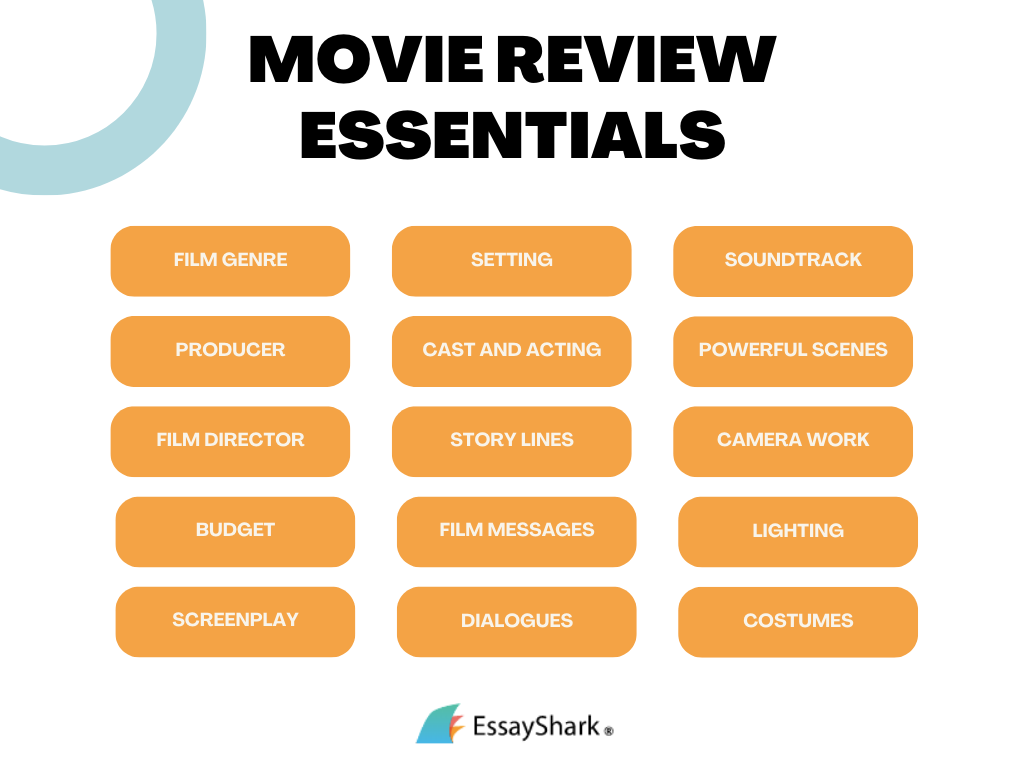
Getting ready to write the movie review
It may seem obvious that for a movie review, you need to watch the movie. But the practice has shown that more than preparing popcorn is required to write a good movie review. Here is some advice you can follow to evaluate the movie better.
- Get prepared. If the movie is filmed based on a book, read it or look through the brief description to have a general idea.
- Make a list of touching points to consider while watching. Learn the teacher’s requirements and also add them to the list. It will help you be more attentive to details.
- Watch the movie two-three times to mention all the details and better evaluate all moments. Refrain from relying on your memory. You can’t remember all the moments at once. Moreover, some moments in movies are revealed only after re-watching. Make sure that you have entirely understood the film.
- Note down the most touching moments while watching. If you watch the record, write down the time to see them again. Note your impressions and thoughts right after the movie ends.
- Learn more about the director and filmography. To make your review more solid and profound, read about the director’s motives for creating this movie, explore the locations where the movie was filmed, events that inspired the director to make the film, etc.
How to write a good movie review for college in 8 steps
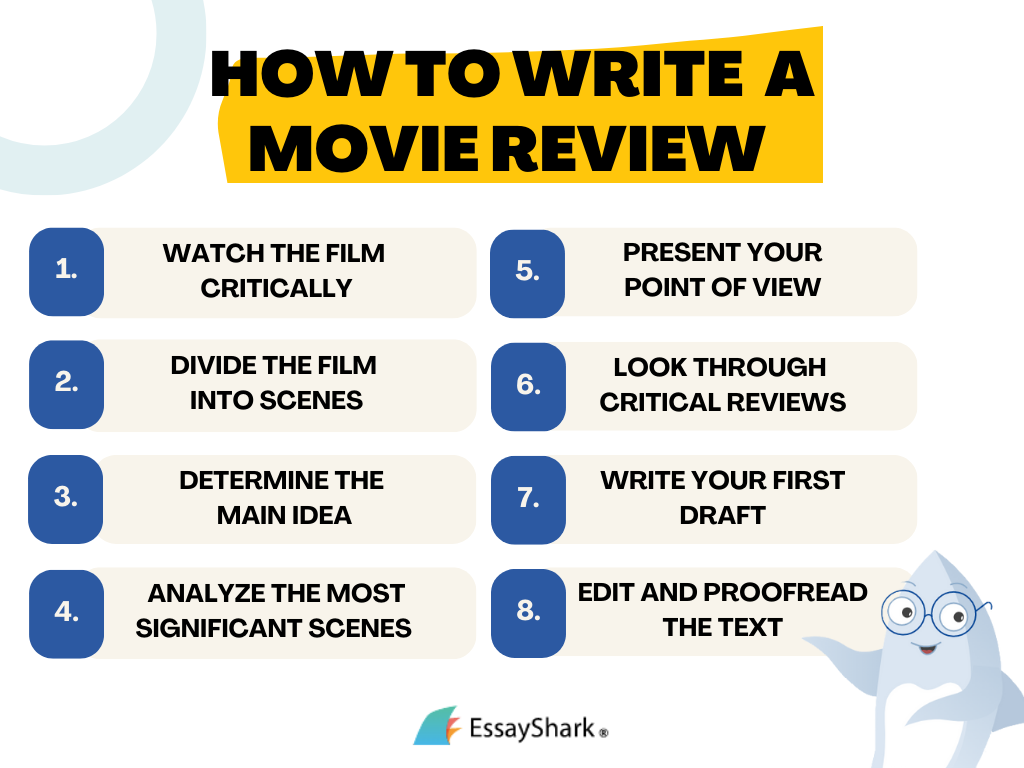
1. Watch the film like a film critic. Even if you have already watched the film several times, it’s time to analyze it from another angle. Do actors wear historically correct costumes? What emotions does the camera operator try to convey? How does one scene move to another? What mood does the color and lighting establish? Try to evaluate all elements that were involved in the film creation.
2. Divide the film into scenes. This will help you find out the sequence of scenes and evaluate their significance to the overall idea. Look how the director moves from one story line to another, presents a story twist, and depicts characters. Does the movie have flashbacks?
3. Look through critical reviews of the movie. Search not only over the internet, but also look at academic databases in your college library. Academic works about films and views of professionals about the films may give you good ideas for your own review.
4. Determine the main thesis. What will be the main thought of your movie review? For example, you can discuss the movie in terms of its effect on the audience, compliance of the film with the depicted epoch, or the quality of the book adaptation.
5. Analyze the most significant scenes. Analyze the location, story development, and camera work. How does the director use technical means and the actors’ performances to create the mood, meaning, and character development?
6. Present your own point of view and understanding of the film. For example, you can explain the philosophical aspects in the movie “Harry Potter and the Goblet of Fire.”
7. Write your first draft. Create an outline that will help you to structure your review. Typically, you will need an introduction, body (review of story, technical characteristics, cast, directing), and conclusion.
8. Edit and proofread the text of your movie review. It’s essential to ensure you have no grammatical errors or other mistakes in the text, as you usually do when you write my college essay . Re-read the text to check whether you have covered all movie scenes, every thought has an ending, and the text reads smoothly.
When you finish your first draft, make sure that your movie review:
- has an attractive and attention-grabbing title;
- has a brief description at the very beginning;
- contains a short overview of the story;
- analyzes the key elements of the movie;
- contains real examples from the movie to back up your personal opinion;
- keeps the ending and story twists a surprise;
- recommends the movie to a particular audience.
Ideas for movie review writing
While writing an effective movie review, you will need to take a certain approach to the movie. Here is a list of approaches that you can apply to your movie review:
- The role of music, special effects, operator work, motifs, editing, characters, or other movie details. For example, you can discuss the role of black and white tones in “Angel-A” (2005) by Luc Besson.
- Analysis of the narrative form. For example, you can define the influence of postmodern scripts in “Pulp Fiction” (1994) by Quentin Tarantino.
- Analysis of a movie from a cultural, political, theoretical, historical, or ideological perspective. You can make a profound analysis of the movie in the context of a particular approach.
- The influence of an artistic vision and the director’s approaches to the overall character of the movie. How has the director’s viewpoint influenced the movie? Do the director’s works have distinctive characteristics that distinguish him or her from other directors?
- Analysis of the film genre from the perspective of typical qualities of the genre. For example, you have chosen the thriller “The Silence of the Lambs.” What typical qualities of a thriller does this movie have? What differentiates it from other thrillers?
- The role of cultural traditions and the country’s history on the film. For example, a typical ending of Hollywood movies is a happy ending. Bollywood movies are typically accompanied by dancing or singing.
- Comparison of two films. It may be two films of one director, or two films on one book or story, or two films of identical genres.
Questions to get more ideas for movie review
– What atmosphere does the movie convey? – How does the director address the story? Which methods were utilized? – How does the film differ from other movies filmed by this director? – Is the script well written? What are the most effective parts? Which parts need more development? – What lessons does the film present? – Does the script flow smoothly? – Are movie characters memorable and clear? Do they change across the film? – What do you think about dialogues? Do they sound truthful and authentic? – How have the actors portrayed their characters? Did the director choose the actors right? – What are the main motives of the main characters? What makes them stand out? – How does the director depict the protagonist and antagonist? How does it influence the full story? – How is the conflict depicted in the film? – Was the setting chosen right? What do you think about the costumes? – What makes this particular movie good for you? – What were your thoughts about the movie at the beginning? Have you changed your mind after you have finished watching the movie?
Movie review example for college students
In the sample below you can read an excerpt of a movie review dedicated to the movie “Donnie Darko.” The author makes a brief overview on the movie, touches the main themes, and makes an argument about the main character. Consider the structure, word choice, and phrases that you can apply to your own review.
Donnie Darko: Superhero or Ordinary Schizo?
The film Donnie Darko was directed by Richard Kelly when he was 26 years old. The director tried to reflect his childhood fears and phobias, providing them with a mystical and fantastic environment. The whole movie was filmed within 28 days and remains on the list of the 250 best movies on IMDB. Donnie Darko is an ordinary American teenager who lives with his family in a small town. However, Donnie has one distinctive feature. He is schizophrenic. Donnie periodically meets a creature named Frank (James Duval), who calls him somewhere or asks about something.
The scene of a family dinner introduces us to Darko’s family. His father is always ready to apply humor to even the most awkward situations. His mother is calm and extremely worried about the future of her children. Despite the fact that all children quarrel, it seems that the family is happy. They have their own problems, but we see that everyone loves each other.
During the film we can trace two main themes: one about God, and the other youthful vitality. These two themes are intertwined, so the viewer may not mention one separately. This also takes place in the confrontation of the young, crazy, idealists (liberals) who are open to new ideas, and the reasonable and cautious adults (conservatives). This was stated from the very beginning: Elizabeth Darko declares that she will vote for Dukakis on recent presidential elections and is not going to marry until she will be thirty. Most of the events in the film show how 15-year-old teenagers can sometimes be wiser and cleverer than teachers. (…)
The music accompaniment highlights the most significant moments in the films. Each moment can be represented as an individual music clip. The Tears for Fears song introduces the college staff during the scene in the school’s hall and makes a strong association of music and the school community. (…)
While Donnie seems to be an awkward teenager, his actions make the viewer think that he is a superhero. During the first conversation, Gretchen asked: “Donnie Darko. What the hell kind of name is that? It’s like some sort of superhero or something.” And Donnie answered: “What makes you think I’m not?” The ending of the movie proves that he was right. (…)
This movie is exceptional, original, and extraordinary. Donnie Darko is not a parody on thrillers and horrors; it’s an extremely serious, dark, and depressive story. The movie can be recommended to teenagers and adults interested in multi-genre films. (…)
Donnie Darko. Directed by James Richard Kelly, Twentieth Century Fox Home Entertainment, 19 Jan. 2001.
More movie review examples
We have gathered some excellent movie review samples in one place for your convenience. Get fresh ideas, analyze the author’s approach, and explore paper structure to understand better the process of writing a movie review. Moreover, we have added videos that you may also find helpful.
Avatar movie review
One can say that “Avatar” by James Cameron is another Pocahontas adaptation. But in fact, the movie has much more to say. Read the following sample to get more ideas and touching points for writing your review about the Avatar movie.
Mad Max movie review
Are you a fan of dystopian future films? Mad Max by George Miller is one of the world classics that is still popular among movie fans. One of our authors has dedicated time and passion to writing this movie review sample. Check it out for inspiration!
In Bruges movie review
It’s always a good idea to write a movie review about a good movie. The movie “In Bruges” by Martin McDonagh has controversial opinions, as it highlights killers in a positive light. Our writer has reviewed the topic in a more catchy way. You can check the sample below if you still need to form your point of view on the movie.
American Beauty movie review
Sam Mendes has genuinely depicted the life of an average middle-class American family. American Beauty is a movie that can entertain for a long time. One of EssayShark’s writers has created the following sample considering all crucial points to create an outstanding movie review on American Beauty.
Suicide Squad movie review
This movie is a treasure for all DC fans. If you plan to write a review on this movie, you are at the right place. Our writer has paid much attention to crafting this unique movie review. Consider the points disclosed in the text and catch the ideas for your writing. Enjoy!
Movie review format
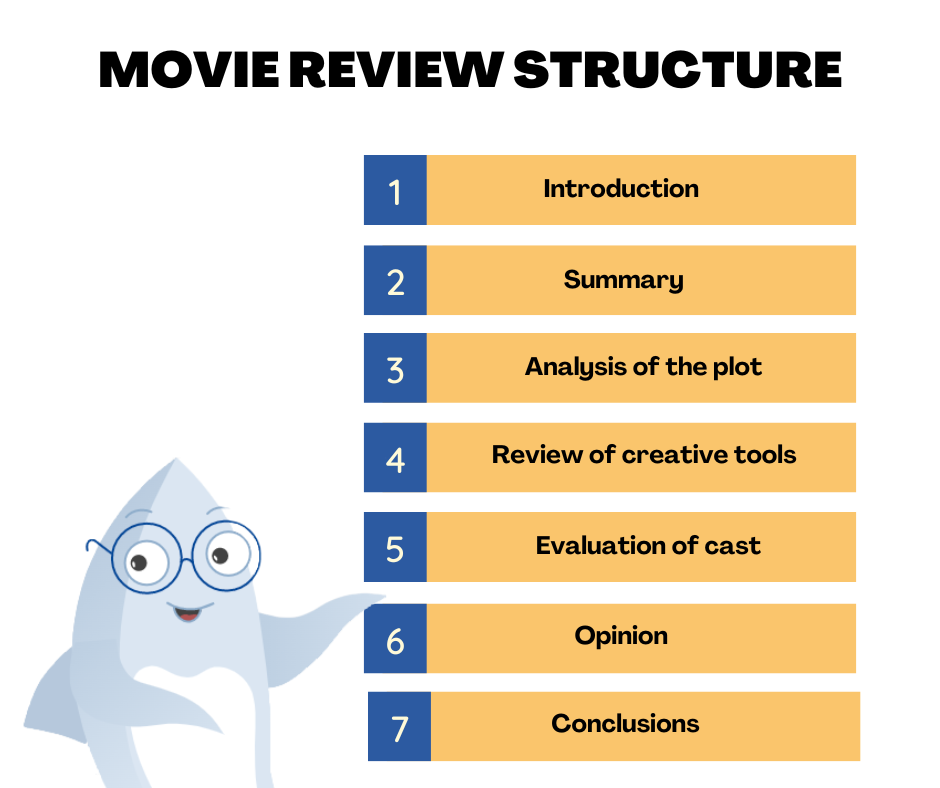
Including all the necessary points in your movie review is essential. Creating an outline will significantly improve your concentration on the movie’s central idea and help you stay aware of the variety of information you wish to disclose.
Below you will find the typical movie review format. You can use it as a basis if the teacher has yet to require the other.
Introduction.
It’s not only the opening words. You should give basic information about the movie right ahead in a movie review. Remember to list the title, director, year of production, and any background information.
Whether your reader has seen the movie or not, you need to shortly write about the story that laid the film’s foundation. Take time to explore other works of the director to compare his movies to other works.
Analysis of the plot.
Evaluate the plot points, which typically include exposition, rising action, dilemma, climax, falling action, and resolution (see the explanation of these words in the image below). The plot structure may differ and contain more or fewer points.
Review of creative tools.
Here you can discuss soundtracks, actors, lighting, camera angles, costumes, dialogues, and other methods contributing to the overall picture and movie perception.
Evaluation of cast.
Acting and actors’ choices may significantly influence the overall portrayal of the story. Think about whether all actors fit their roles and the quality of their performance.
If you have found any plot gaps or wish to make an accent on the most exciting twists in the film, support it with facts from the movie. Explain whether the director succeeded in telling the story and how. If required, relate the topic to your course, its similarity with the original book, or the topic’s relevance nowadays.
Conclusions.
The final paragraph is always a summary of your main point previously disclosed. Sum up the director’s efforts to create the picture and restate the most exciting moments from the movie.
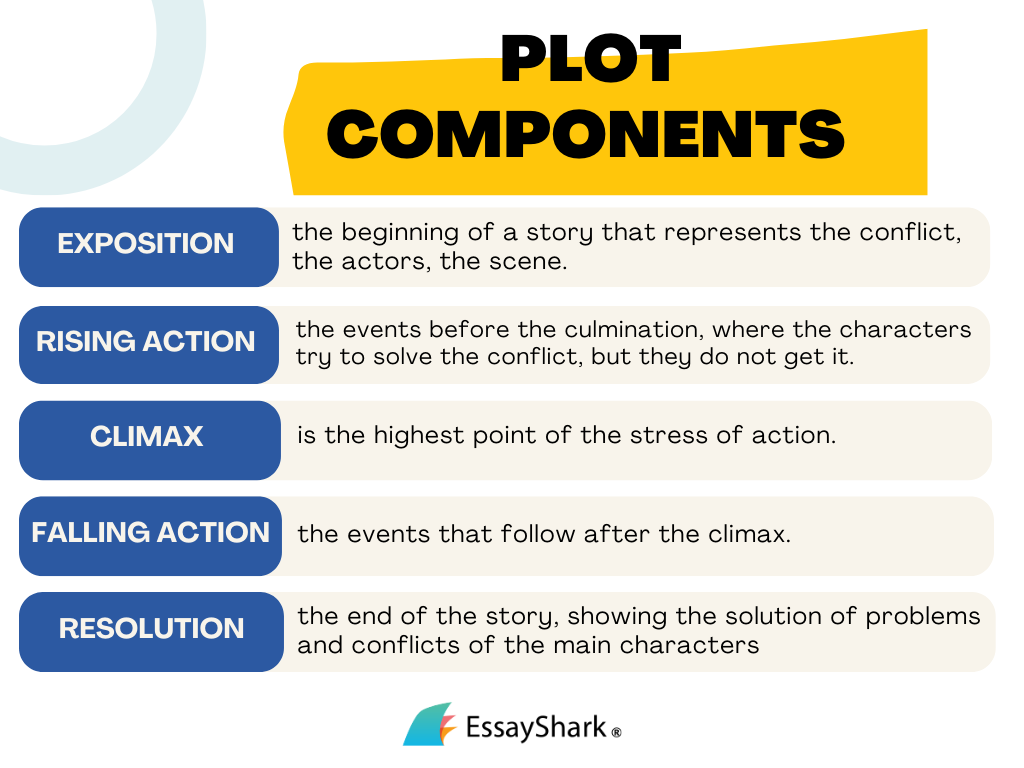
Tips to consider while writing a movie review for college
- Browse the IMDB terminology glossary and apply it to your writing. This will make your review look more professional.
- Always consider the audience you are writing to. Apply the right writing style to make your text more compelling to the reader.
- Use facts, numbers, and statistics to make your review more credible, as well as professional writers to, when you pay for essay to save your time. Quote the director’s and producer’s views on the film, or cite professional movie critics.
- Use active sentences. It is fine to write several sentences using passive voice, but don’t overuse it.
- Provide evidence to prove your point of view. For example, you can add descriptions of scenes or character descriptions.
- Use phrases from our phrase list that you can read below.
Phrases to use in your movie review
Introduction:
It is a typical representative of the drama/ comedy/ action film/ thriller genre … The movie was directed/ produced by … The script was written by/ was take from … The story is about… The movie has a classical/ multiple timeline/ hyperlink/ circular structure …
The film contains/ is full/ gets … The music underlines/ conveys/ supports … The story unfolds/ takes place/ creates an atmosphere … The story arises curiosity/ keeps tension/ entertains/ touches/ thrills/ has unexpected twists … Dialogues are melodramatic/ convincing/ realistic … The actors’ performances are exceptional/ personal/ touching/ realistic/ appealing/ convincing … The film contains a few funny/ scary/ strange scenes … The film gets extremely funny/ dramatic/ thrilling in places … The most powerful scene is …
If you enjoy …, you will like this film … The film literally … If you find films/ works of director X compelling, you will enjoy this film too … This film will change the way you think … I certainly/ definitely recommend this film to … On a scale from ten to zero … Summing up, the film is must-see/ worth seeing/ shouldn’t be missed/ box office success …
Additional description table for movie review writing
Mistakes to avoid while writing a movie review.
- Losing focus on the movie. It’s a good idea to mention the history of creating the film or touch on the historical background of the documentary film. But try to add only a bit of related information. Ensure you have included only the necessary details, and stay tuned for the review of the movie itself.
- Talking too much about yourself. While the review is more about presenting a personal point of view, you are still writing an academic paper which means you must avoid “I” statements and write in the third person.
- Forgetting to add factual information about the film. It’s crucial to add a summary and general information about the movie.
- Stating your point of view without factual support. Always accompany your thoughts with short descriptions of movie episodes.
- Writing general phrases like “the actors’ play was awful” or “the end of the movie was predictable.” Think of using more specific terms that you can find in this article or use your imagination.
- Creating a text without any analytical component. A good movie review is only possible by critically evaluating the plot, actors’ play, and creative elements.
Movie review writing assistance from the experts
We hope that our article will help you create an astonishing review. You can find additional information about how to write a movie review from our team of paper writers . We hope you will enjoy your writing! In any case, remember that our service is always online to help you take care of your homework assignments. Just let us know that you need help by completing the order form on this page. Good luck!
Photo by anncapictures from Pixabay

Leave a Reply Cancel reply
Your email address will not be published. Required fields are marked *
Save my name, email, and website in this browser for the next time I comment.
What our customers say
Our website uses secure cookies. More details
Get professional help from best writers right from your phone

Grab our 3 e-books bundle for $27 FREE
Ask Yale Library
My Library Accounts
Find, Request, and Use
Help and Research Support
Visit and Study
Explore Collections
Film Studies Research Guide: Film Reviews
- Film Reviews
- Films & Videos
- Screenplays/Filmscripts
- Archives & Institutes
- Critical Approaches & Problems
- Directors, Actors, Writers, etc.
- Filmmaking, Producing, etc.
- Genres, Styles, Categories, Series
- History and/of Film
- International Cinema
- Literature & Film
- Movie Business & Studios
- Music & Sound in Movies
- Social & Other Aspects
- Themes, Subjects & Characters
- Annuals & Directories
- Bibliographies & Filmographies
- Biographies, Credits & Plots
- Dictionaries & Encyclopedias
- Festivals & Awards
- Guides & Companions to Films
- Organizations & Associations
Key Databases and Indexes for Film Reviews
- The New York Times: 1923-2016
- Variety (1905-2000)
- Film and Television Literature Index
- Film Review Index. Ed. Patricia King Hanson. Perhaps the best resource for finding older reviews, consisting of a two-volume comprehensive index of movie reviews from 1882 through 1985.
Other Databases for Reviews
- Academic Search Premier Use Academic Search Premier to search for articles in thousands of different scholarly journals and general interest magazines. Coverage extends back to the mid-1980s.
- Art Index Retrospective (1929-1984) Type [name of film] Motion Picture Reviews to find reviews about particular films. For example, you can do a keyword search for Fargo Motion Picture Reviews or Midnight Garden Good Evil Motion Picture Reviews.
- Humanities & Social Sciences Index Retrospective (1907-1984) Type [name of film] Motion Picture Reviews to find reviews about particular films. For example, you can do a keyword search for Fargo Motion Picture Reviews or Midnight Garden Good Evil Motion Picture Reviews.
Additional Film Databases and Indexes
You can search the Orbis catalog for sources of film reviews by using the example subject headings below as a guide.
- Motion pictures--Reviews
- Motion pictures--Reviews--Indexes
- Motion pictures--Reviews--Periodicals
- Motion pictures--Brazil--Reviews
- Motion pictures, Italian--Reviews
These subject searches also provide a way to find books which collect reviews, such as Pauline Kael's 5001 Nights at the Movies , and American Movie Critics: An Anthology From the Silents Until Now (ed. Phillip Lopate).
The following list covers additional sources of film reviews, primarily "authoritative" ones but also a handful of "popular" review websites and blogs. Some of these resources list reviews published before the mid 1970s -- they might be the only way to find reviews published when an older film was released.
- Film daily: the daily newspaper of motion pictures Publication Date: 1918-1968 This newspaper began under the title Wid's Daily (1918-1921), and also published the Film daily year book of motion pictures (1918-1969). We have most of the runs, but there are some gaps.
- Film Indexes Online Film Indexes Online is a portal that allows one to simultaneously search both the American Film Institute Catalog and Film Index International. For descriptions of these databases, please see their entries on the Articles page.
- The New Movies by National Board of Review of Motion Pictures (later Films in Review) Publication Date: 1942-1949
- Films in Review by National Board of Review of Motion Pictures Publication Date: 1950-1997
- Films in Review by National Board of review of Motion Pictures (electronic resource) Publication Date: 1950-1997
- Film Review Annual by J.S. Ozer Publication Date: 1981-2002 The most recent volume is in Bass. Previous volumes are in SML.
- Index to Motion Pictures Reviewed by Variety, 1907-1980 by Max Joseph Alvarez
- International Index to the Performing Arts
- Metacritic Provides access to and summarizes entertainment criticism available online. Combines the individual critic scores into an overall grade for each item.
- Movie Review Query Engine (MRQE) Simple search engine query webpage for finding movie review articles on film titles. Also browseable by pre-compiled lists of titles by category/awards nominations.
- The New Film Index: A Bibliography of Magazine Articles in English, 1930-1970 by Richard Dyer MacCann
- New York Times Film Reviews Publication Date: 1913-1968, 1971-1988, 1991-1998
- New York Times Historical Database
- Rotten Tomatoes Strives to summarize critical reaction on movies by averaging the scores given by its list of critics, who are mostly from accredited media outlets and online film societies.
- Variety Publication Date: 1905-2008
- Daily Variety (Online) Available from Apr. 1992 to 2013. Another online source also has it from a certain date: Academic OneFile (Nov. 2000 to present).
- Variety Film Reviews, 1907-1996
- << Previous: Articles
- Next: Films & Videos >>
- Last Updated: Mar 24, 2024 11:29 PM
- URL: https://guides.library.yale.edu/film
Site Navigation
P.O. BOX 208240 New Haven, CT 06250-8240 (203) 432-1775
Yale's Libraries
Bass Library
Beinecke Rare Book and Manuscript Library
Classics Library
Cushing/Whitney Medical Library
Divinity Library
East Asia Library
Gilmore Music Library
Haas Family Arts Library
Lewis Walpole Library
Lillian Goldman Law Library
Marx Science and Social Science Library
Sterling Memorial Library
Yale Center for British Art
SUBSCRIBE TO OUR NEWSLETTER
@YALELIBRARY

Yale Library Instagram
Accessibility Diversity, Equity, and Inclusion Giving Privacy and Data Use Contact Our Web Team
© 2022 Yale University Library • All Rights Reserved
Have a language expert improve your writing
Run a free plagiarism check in 10 minutes, generate accurate citations for free.
- Knowledge Base
Methodology
- How to Write a Literature Review | Guide, Examples, & Templates
How to Write a Literature Review | Guide, Examples, & Templates
Published on January 2, 2023 by Shona McCombes . Revised on September 11, 2023.
What is a literature review? A literature review is a survey of scholarly sources on a specific topic. It provides an overview of current knowledge, allowing you to identify relevant theories, methods, and gaps in the existing research that you can later apply to your paper, thesis, or dissertation topic .
There are five key steps to writing a literature review:
- Search for relevant literature
- Evaluate sources
- Identify themes, debates, and gaps
- Outline the structure
- Write your literature review
A good literature review doesn’t just summarize sources—it analyzes, synthesizes , and critically evaluates to give a clear picture of the state of knowledge on the subject.
Instantly correct all language mistakes in your text
Upload your document to correct all your mistakes in minutes

Table of contents
What is the purpose of a literature review, examples of literature reviews, step 1 – search for relevant literature, step 2 – evaluate and select sources, step 3 – identify themes, debates, and gaps, step 4 – outline your literature review’s structure, step 5 – write your literature review, free lecture slides, other interesting articles, frequently asked questions, introduction.
- Quick Run-through
- Step 1 & 2
When you write a thesis , dissertation , or research paper , you will likely have to conduct a literature review to situate your research within existing knowledge. The literature review gives you a chance to:
- Demonstrate your familiarity with the topic and its scholarly context
- Develop a theoretical framework and methodology for your research
- Position your work in relation to other researchers and theorists
- Show how your research addresses a gap or contributes to a debate
- Evaluate the current state of research and demonstrate your knowledge of the scholarly debates around your topic.
Writing literature reviews is a particularly important skill if you want to apply for graduate school or pursue a career in research. We’ve written a step-by-step guide that you can follow below.

Prevent plagiarism. Run a free check.
Writing literature reviews can be quite challenging! A good starting point could be to look at some examples, depending on what kind of literature review you’d like to write.
- Example literature review #1: “Why Do People Migrate? A Review of the Theoretical Literature” ( Theoretical literature review about the development of economic migration theory from the 1950s to today.)
- Example literature review #2: “Literature review as a research methodology: An overview and guidelines” ( Methodological literature review about interdisciplinary knowledge acquisition and production.)
- Example literature review #3: “The Use of Technology in English Language Learning: A Literature Review” ( Thematic literature review about the effects of technology on language acquisition.)
- Example literature review #4: “Learners’ Listening Comprehension Difficulties in English Language Learning: A Literature Review” ( Chronological literature review about how the concept of listening skills has changed over time.)
You can also check out our templates with literature review examples and sample outlines at the links below.
Download Word doc Download Google doc
Before you begin searching for literature, you need a clearly defined topic .
If you are writing the literature review section of a dissertation or research paper, you will search for literature related to your research problem and questions .
Make a list of keywords
Start by creating a list of keywords related to your research question. Include each of the key concepts or variables you’re interested in, and list any synonyms and related terms. You can add to this list as you discover new keywords in the process of your literature search.
- Social media, Facebook, Instagram, Twitter, Snapchat, TikTok
- Body image, self-perception, self-esteem, mental health
- Generation Z, teenagers, adolescents, youth
Search for relevant sources
Use your keywords to begin searching for sources. Some useful databases to search for journals and articles include:
- Your university’s library catalogue
- Google Scholar
- Project Muse (humanities and social sciences)
- Medline (life sciences and biomedicine)
- EconLit (economics)
- Inspec (physics, engineering and computer science)
You can also use boolean operators to help narrow down your search.
Make sure to read the abstract to find out whether an article is relevant to your question. When you find a useful book or article, you can check the bibliography to find other relevant sources.
You likely won’t be able to read absolutely everything that has been written on your topic, so it will be necessary to evaluate which sources are most relevant to your research question.
For each publication, ask yourself:
- What question or problem is the author addressing?
- What are the key concepts and how are they defined?
- What are the key theories, models, and methods?
- Does the research use established frameworks or take an innovative approach?
- What are the results and conclusions of the study?
- How does the publication relate to other literature in the field? Does it confirm, add to, or challenge established knowledge?
- What are the strengths and weaknesses of the research?
Make sure the sources you use are credible , and make sure you read any landmark studies and major theories in your field of research.
You can use our template to summarize and evaluate sources you’re thinking about using. Click on either button below to download.
Take notes and cite your sources
As you read, you should also begin the writing process. Take notes that you can later incorporate into the text of your literature review.
It is important to keep track of your sources with citations to avoid plagiarism . It can be helpful to make an annotated bibliography , where you compile full citation information and write a paragraph of summary and analysis for each source. This helps you remember what you read and saves time later in the process.
Don't submit your assignments before you do this
The academic proofreading tool has been trained on 1000s of academic texts. Making it the most accurate and reliable proofreading tool for students. Free citation check included.

Try for free
To begin organizing your literature review’s argument and structure, be sure you understand the connections and relationships between the sources you’ve read. Based on your reading and notes, you can look for:
- Trends and patterns (in theory, method or results): do certain approaches become more or less popular over time?
- Themes: what questions or concepts recur across the literature?
- Debates, conflicts and contradictions: where do sources disagree?
- Pivotal publications: are there any influential theories or studies that changed the direction of the field?
- Gaps: what is missing from the literature? Are there weaknesses that need to be addressed?
This step will help you work out the structure of your literature review and (if applicable) show how your own research will contribute to existing knowledge.
- Most research has focused on young women.
- There is an increasing interest in the visual aspects of social media.
- But there is still a lack of robust research on highly visual platforms like Instagram and Snapchat—this is a gap that you could address in your own research.
There are various approaches to organizing the body of a literature review. Depending on the length of your literature review, you can combine several of these strategies (for example, your overall structure might be thematic, but each theme is discussed chronologically).
Chronological
The simplest approach is to trace the development of the topic over time. However, if you choose this strategy, be careful to avoid simply listing and summarizing sources in order.
Try to analyze patterns, turning points and key debates that have shaped the direction of the field. Give your interpretation of how and why certain developments occurred.
If you have found some recurring central themes, you can organize your literature review into subsections that address different aspects of the topic.
For example, if you are reviewing literature about inequalities in migrant health outcomes, key themes might include healthcare policy, language barriers, cultural attitudes, legal status, and economic access.
Methodological
If you draw your sources from different disciplines or fields that use a variety of research methods , you might want to compare the results and conclusions that emerge from different approaches. For example:
- Look at what results have emerged in qualitative versus quantitative research
- Discuss how the topic has been approached by empirical versus theoretical scholarship
- Divide the literature into sociological, historical, and cultural sources
Theoretical
A literature review is often the foundation for a theoretical framework . You can use it to discuss various theories, models, and definitions of key concepts.
You might argue for the relevance of a specific theoretical approach, or combine various theoretical concepts to create a framework for your research.
Like any other academic text , your literature review should have an introduction , a main body, and a conclusion . What you include in each depends on the objective of your literature review.
The introduction should clearly establish the focus and purpose of the literature review.
Depending on the length of your literature review, you might want to divide the body into subsections. You can use a subheading for each theme, time period, or methodological approach.
As you write, you can follow these tips:
- Summarize and synthesize: give an overview of the main points of each source and combine them into a coherent whole
- Analyze and interpret: don’t just paraphrase other researchers — add your own interpretations where possible, discussing the significance of findings in relation to the literature as a whole
- Critically evaluate: mention the strengths and weaknesses of your sources
- Write in well-structured paragraphs: use transition words and topic sentences to draw connections, comparisons and contrasts
In the conclusion, you should summarize the key findings you have taken from the literature and emphasize their significance.
When you’ve finished writing and revising your literature review, don’t forget to proofread thoroughly before submitting. Not a language expert? Check out Scribbr’s professional proofreading services !
This article has been adapted into lecture slides that you can use to teach your students about writing a literature review.
Scribbr slides are free to use, customize, and distribute for educational purposes.
Open Google Slides Download PowerPoint
If you want to know more about the research process , methodology , research bias , or statistics , make sure to check out some of our other articles with explanations and examples.
- Sampling methods
- Simple random sampling
- Stratified sampling
- Cluster sampling
- Likert scales
- Reproducibility
Statistics
- Null hypothesis
- Statistical power
- Probability distribution
- Effect size
- Poisson distribution
Research bias
- Optimism bias
- Cognitive bias
- Implicit bias
- Hawthorne effect
- Anchoring bias
- Explicit bias
A literature review is a survey of scholarly sources (such as books, journal articles, and theses) related to a specific topic or research question .
It is often written as part of a thesis, dissertation , or research paper , in order to situate your work in relation to existing knowledge.
There are several reasons to conduct a literature review at the beginning of a research project:
- To familiarize yourself with the current state of knowledge on your topic
- To ensure that you’re not just repeating what others have already done
- To identify gaps in knowledge and unresolved problems that your research can address
- To develop your theoretical framework and methodology
- To provide an overview of the key findings and debates on the topic
Writing the literature review shows your reader how your work relates to existing research and what new insights it will contribute.
The literature review usually comes near the beginning of your thesis or dissertation . After the introduction , it grounds your research in a scholarly field and leads directly to your theoretical framework or methodology .
A literature review is a survey of credible sources on a topic, often used in dissertations , theses, and research papers . Literature reviews give an overview of knowledge on a subject, helping you identify relevant theories and methods, as well as gaps in existing research. Literature reviews are set up similarly to other academic texts , with an introduction , a main body, and a conclusion .
An annotated bibliography is a list of source references that has a short description (called an annotation ) for each of the sources. It is often assigned as part of the research process for a paper .
Cite this Scribbr article
If you want to cite this source, you can copy and paste the citation or click the “Cite this Scribbr article” button to automatically add the citation to our free Citation Generator.
McCombes, S. (2023, September 11). How to Write a Literature Review | Guide, Examples, & Templates. Scribbr. Retrieved June 7, 2024, from https://www.scribbr.com/dissertation/literature-review/
Is this article helpful?
Shona McCombes
Other students also liked, what is a theoretical framework | guide to organizing, what is a research methodology | steps & tips, how to write a research proposal | examples & templates, what is your plagiarism score.
Purdue Online Writing Lab Purdue OWL® College of Liberal Arts
APA Sample Paper

Welcome to the Purdue OWL
This page is brought to you by the OWL at Purdue University. When printing this page, you must include the entire legal notice.
Copyright ©1995-2018 by The Writing Lab & The OWL at Purdue and Purdue University. All rights reserved. This material may not be published, reproduced, broadcast, rewritten, or redistributed without permission. Use of this site constitutes acceptance of our terms and conditions of fair use.
Note: This page reflects the latest version of the APA Publication Manual (i.e., APA 7), which released in October 2019. The equivalent resource for the older APA 6 style can be found here .
Media Files: APA Sample Student Paper , APA Sample Professional Paper
This resource is enhanced by Acrobat PDF files. Download the free Acrobat Reader
Note: The APA Publication Manual, 7 th Edition specifies different formatting conventions for student and professional papers (i.e., papers written for credit in a course and papers intended for scholarly publication). These differences mostly extend to the title page and running head. Crucially, citation practices do not differ between the two styles of paper.
However, for your convenience, we have provided two versions of our APA 7 sample paper below: one in student style and one in professional style.
Note: For accessibility purposes, we have used "Track Changes" to make comments along the margins of these samples. Those authored by [AF] denote explanations of formatting and [AWC] denote directions for writing and citing in APA 7.
APA 7 Student Paper:
Apa 7 professional paper:.

- Walden University
- Faculty Portal
Academic Skills: Paper Reviews
- Academic Skills
- Sample Paper Reviews
- Scholarly Research and Writing With AI Tools
- Meet the Peer Mentors
- Previous Page: Academic Skills
- Next Page: Sample Paper Reviews
Get Feedback on Your Writing
In a paper review, you can expect individualized suggestions and instruction to improve your writing skills.
Steps for getting started
- Register in myPASS (my Paper Appointment Scheduling System)
- Make an appointment
- Wait for an automated email with feedback in your own draft
Review the section on How to Register and Schedule in myPASS for more information.
Schedule a Paper Review in myPASS
What to Expect in a Paper Review
We provide constructive feedback on topics like:
- Organization and paragraphing
- Effective integration of evidence
- Cohesion and flow
- Scholarly voice and grammar
We typically focus on just a few topics or patterns to provide a helpful and manageable quantity of feedback.
Paper Reviews ARE
- Individualized feedback from a writing professional
- For students working on coursework including discussion posts, course papers, master’s capstones, and the doctoral premise and prospectus
- Focused on skill building and instruction based on patterns in a student’s draft
- Asynchronous: There is no phone call or online meeting time
- An optional, supplementary service available to Walden University students at no additional cost
Paper Reviews ARE NOT
- For proofreading or editing (try Grammarly and these Proofreading Strategies )
- For specific writing or APA questions; for those, you can Ask OASIS
- For students working on doctoral capstone drafts beyond the prospectus
- Connected to a university approval process
See Examples of What to Expect in Our Sample Paper Reviews
“It has been a challenge figuring out the areas I needed to improve on, and [the Specialist's] comments and responses have helped me a great deal. I'm not there yet, but this is helping me learn how to structure my writing.” – Walden Doctoral Student
How to Register and Schedule in myPASS
Documents we review, register in mypass, make a paper review appointment and attach your documents, join a waitlist, view your scheduled paper reviews, attach a document at a later date, cancel an appointment.
“The feedback was very thorough and the tips were clear enough to apply to my writing immediately.” – Walden Doctoral Student
Are you working on your doctoral proposal or final study?
Writing support for doctoral proposals and final studies can be found on the Doctoral Capstone Form and Style site.
Doctoral Capstone Form and Style
“[The Specialist] helped me to see where I could improve my writing and encouraged me in my good writing skills! I will definitely reach out in the future for writing assistance! Thank you!” – Walden Master’s Student
Our Mission
We are writing experts who work with Walden students of all abilities. Through our one-on-one paper reviews, we help students develop their academic writing skills as emerging scholars and encourage students to engage in an ongoing writing process.
What Students Are Saying About Paper Reviews
“The [Writing Support team] is one of the most important resources at Walden University and I probably would not be passing my classes without their assistance, even though I had considered myself a proficient writer before attending Walden. Every single person who has reviewed my papers is always professional and provides excellent advice while encouraging my writing to continue.” – Walden Bachelor’s Student
“Having another set of eyes read my paper and notice things that I missed is very helpful. I am glad for her skills in reviewing my paper.” – Walden Master’s Student
“The feedback made me more aware of how I can strengthen my writing. Also, it really helped with the resources and in-text cites.” – Walden Master’s Student
“I appreciate all the help I have received from you in the last few months. You truly have been pivotal in my journey. Thank you :)” – Walden Master’s Student
“I have never used a writing support service before. What a wonderful introduction! I will be submitting papers often, and I am looking forward to learning and improving.” – Walden Master’s Student
- Office of Student Disability Services
Walden Resources
Departments.
- Academic Residencies
- Career Planning and Development
- Customer Care Team
- Field Experience
- Military Services
- Student Success Advising
- Writing Skills
Centers and Offices
- Center for Social Change
- Office of Academic Support and Instructional Services
- Office of Degree Acceleration
- Office of Research and Doctoral Services
- Office of Student Affairs
Student Resources
- Doctoral Writing Assessment
- Form & Style Review
- Quick Answers
- ScholarWorks
- SKIL Courses and Workshops
- Walden Bookstore
- Walden Catalog & Student Handbook
- Student Safety/Title IX
- Legal & Consumer Information
- Website Terms and Conditions
- Cookie Policy
- Accessibility
- Accreditation
- State Authorization
- Net Price Calculator
- Contact Walden
Walden University is a member of Adtalem Global Education, Inc. www.adtalem.com Walden University is certified to operate by SCHEV © 2024 Walden University LLC. All rights reserved.
Review: The Force is not with new Jedi-centric 'Star Wars: The Acolyte'

"Star Wars" is a complicated beast.
Sometimes it's dark, complex and ambitious, like Disney+ series "Andor" or "The Last Jedi" film. Sometimes it's rousing, epic and feel-good ("Return of the Jedi.") And sometimes it's just weird, silly and unsatisfying (prequel "The Phantom Menace").
So perhaps it's only fitting that the prequel to that prequel, Disney+'s new series "The Acolyte" (streaming Tuesdays, 9 EDT/PDT, ★★ out of four) falls into that last category. Full of logical fallacies, hokey dialogue and nonsensical plots, "Acolyte" feels entirely of a piece with the worst elements of the prequel trilogy, which many hardcore fans love to hate, even 25 years later. The series, created by "Russian Doll" producer Leslye Headland, certainly has ambition as it tries to tell a showy story about the mythology and magic of the Jedi and the Force. But even the best of intentions can go awry.
Join our Watch Party! Sign up to receive USA TODAY's movie and TV recommendations right in your inbox
All the sci-fi/fantasy jargon, dramatic costumes, brightly colored lightsabers, fancy hairdos and ominous villains Headland can stuff into "Acolyte" can't make a good story on their own. There has to be some emotion and depth to the characters and their woes. There has to be more than perfunctory plot points. There has to be a sense of adventure and wonder. And there has to be something that captures the feeling of "Star Wars," not just the aesthetics. "Acolyte" doesn't have it, no matter how hard it tries.
A century before Obi-Wan (Ewan McGregor) and Qui-Gon (Liam Neeson) felt a disturbance in the Force in "Phantom," a rogue "Force-user" is hunting and killing Jedi masters across the galaxy. At first thought to be former Jedi Padawan Osha (Amandla Stenberg), it turns out the Jedi killer is her twin sister, Mae (also Stenberg), long presumed dead after a mysterious fire when the two were children. The blaze resulted in the death of their family and Osha being taken into the Jedi order. (This "twist" is revealed in the first few minutes of the series premiere.)
Determined to bring in Mae or Osha (or both) and figure all this out is Jedi Master Sol (Lee Jung-jae, "Squid Game"), who trained Osha before she left the order. He's joined by a handful of other colorful and utterly forgettable Jedi: Is Mae out for revenge for what she believed happened to her family all those years ago? Or is there a more nefarious power brewing in the galaxy? There's the pickle, and a flashback episode featuring Jodie Turner-Smith as the girls' mother, Aniseya, and the leader of a "witch coven" doesn't provide many answers.
It's all a little too complex (witches, in this galaxy?) and a little too simple (ah yes, the old evil-twin twist). The reveal of Mae comes too early in the series, removing much of the mystery element that makes "Acolyte" unique in the ever-expanding "Star Wars" canon. There are too many characters with too many quirks to make them stand out from one another. You'll be hard-pressed to tell the difference between various aliens paired with Charlie Barnett's Jedi knight Yord.
But "Acolyte" has its moments. The final scene of Episode 4 (the last made available for review) captures a real sense of horror and fear when a villain is introduced. Perhaps that bodes well for the final four episodes in the season. Jung-jae and Stenberg make a great pair, and the former nicely proves his acting chops in English (he won an Emmy for "Squid," which was entirely in Korean). And it's always nice to see "Matrix" star Carrie Ann Moss, who appears briefly in two episodes, wielding a lightsaber as if she's done it all her life.
Certainly a segment of the "Star Wars" fandom will devour every frame of "Acolyte." For them, the complex mythology is the meat of the meal, not a frilly and silly garnish. But superfans can forgive a lot of sins. Some genre TV series can make their mythology and internal world-building more interesting and engaging than this (Amazon's late, great "The Expanse," among many others). As it stands, though, the Jedi lore is obtuse and dull. It needs spicing up.
Like the young Padawans (the "Star Wars" term for students or apprentices) that are omnipresent in the series, "Acolyte" has a great deal of potential. "The Mandalorian" made "Star Wars" a Western. "Andor" made it a revolution . "Acolyte" could have made it a great work of fantasy and mystery.
But mostly it's a great big sigh.
2024 Theses Doctoral
Understanding Consumer Emotions from User-Generated Content
Wu, Yinghao
This dissertation aims to provide a deeper understanding of consumer emotions from user-generated content. In the first essay of my dissertation, “Digital Therapy for Negative Consumption Experiences: The Impact of Emotional and Rational Reviews on Review Writers and Readers,” we examine whether the manner in which a consumer writes a review can help them recover from a negative consumption experience, as well as how this influences other review readers. To test these research questions, we use a multimethod approach and collect archival data, field data, and participants’ physiological responses as well as memory recall. We employ machine learning techniques to train multilabel classifiers with review textual data and categorize online reviews into one of the three types: emotional (feelings and emotions), rational (facts, beliefs, and thought processes), and integrated (the combination of the two). We first show that, similar to writing about traumatic life experiences, when a review writer writes an integrated review about a negative experience (compared to when they only express emotional or rational aspects), they feel better afterwards and are more likely to purchase again. We also show that integrated reviews do not any have adverse effects on review readers. Finally, in two controlled experiments, we examine the underlying mechanisms for this positive effect of writing an integrated review on review writers by collecting biophysiological response data (i.e., review writers’ blood pressure and pulse) and by analyzing thought listing data. The results show that writing an integrated review about a negative consumption experience appears to lead to catharsis and cognitive reappraisal of the negative experience, which in turn lead to better outcomes. This research shows that writing online reviews can serve as a digital therapy tool that helps consumers recover from negative consumer experiences and has positive benefits for the involved firms. This has important implications for the design of review systems and for firms, especially in situations where customers have negative experiences with their products and services. The first essay of my dissertation suggests that consumers can benefit by expressing emotions (together with rational thoughts) in their online reviews. In the second essay of my dissertation, “Are Emotions Gendered? Gender Stereotypes in Online Reviews,” we examine whether the domain of online reviews is inclusive enough to allow all consumers to feel free to express their emotions. In this research, we examine whether review readers’ reactions to reviews where writers express their emotion vary with the gender of the review writer. More specifically, we examine how gender stereotypes in general, and the belief that females are more emotional than males in particular, influences review readers’ reactions to reviews as well as the manner in which review writers construct their reviews. We find that even though the domain of online reviews is a relatively private and safe place for consumers to express their evaluations of products and services, a common feature of online review system designs, that is asking review writers to provide an avatar and/or names that might reflect their gender, leads to less favorable reactions to reviews written by women (vs. men) because of gender stereotypes. Further, when the stereotype that women are more emotional than men is made salient before review writing (versus when it is not), female review writers express less emotion, possibly because emotionality has negative associations such as being “irrational,” “overdramatic,” and “sensitive.” This finding is important because other research has shown that reviews that contain more emotion are evaluated more positively by review readers. Most importantly, while we provide evidence that this stereotype is believed and has a negative impact on review writers and readers, we show that it is not true in this context – females are no more emotional than men in review writing contexts.
- Consumer behavior
- Consumers--Psychology
- Sex differences (Psychology)
- Stereotypes (Social psychology)
- Business--Psychological aspects
This item is currently under embargo. It will be available starting 2029-05-22.
More About This Work
- DOI Copy DOI to clipboard
The Watchers review: Ishana Night Shyamalan's wobbly horror baby steps
The filmmaker's debut certainly feels like one, even if she's clearly got competent chops

Hit Man review: Killer chemistry meets existential examination
Richard Linklater’s sexy film noir-comedy heads to Netflix after a brief theatrical release

Tuesday review: Too much of everything, everywhere, all at once
While Julia Louis-Dreyfus going to war against a giant Death Parrot may sound interesting, Tuesday struggles to stay …

Handling The Undead review: Moody Norwegian zombie tale is sad, and not much else
Would-be elegy offers neither conventional catharsis nor enough mesmeric insight to justify its somberness
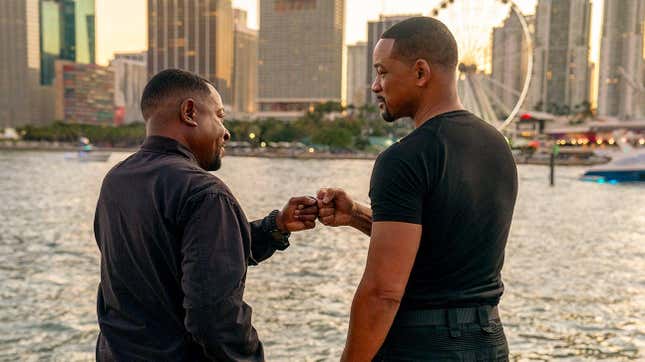
Bad Boys: Ride Or Die review: Middle-aged franchise is still dumb fun
The adult boys are still bad and still bloodthirsty, despite now potentially being AARP members

I Used To Be Funny review: Rachel Sennott shows off drama chops in predictable drama
The feature debut from music video director Ally Pankiw is a sober story of sexual assault
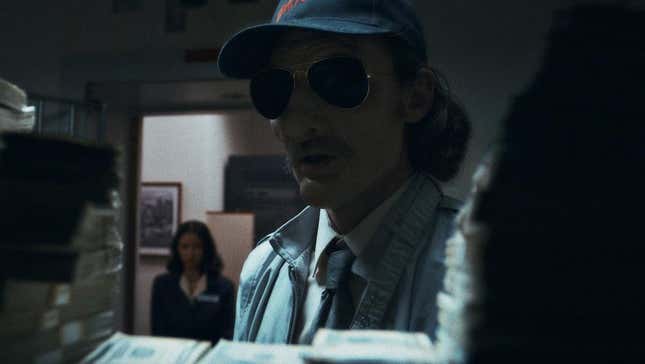
How To Rob A Bank review: "Hollywood" thief gets Hollywood doc treatment
Outlaw Scott Scurlock can still seduce audiences and filmmakers years after his death
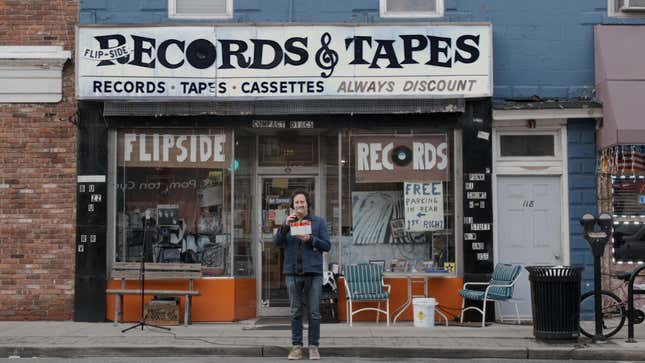
Flipside review: A poignant self-portrait of a filmmaker's midlife crisis
Chris Wilcha weaves the loose threads of his abandoned projects into a documentary greater than the sum of its parts
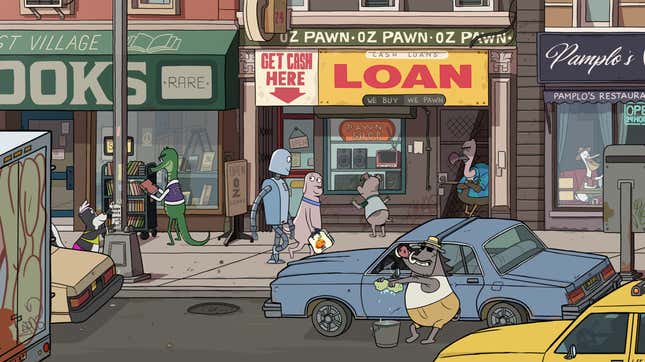
Robot Dreams animates New York City hustle without saying a word
Pablo Berger's Oscar-nominated animated daydream is an episodic tale of friendship deferred

Ezra review: A kind if cloying dramedy about autism
Bobby Cannavale, Rose Byrne, and Robert De Niro are outshined by newcomer William A. Fitzgerald

Solo review: Drag queen struggles to claim her time in the spotlight
Writer-director Sophie Dupuis reunites with Théodore Pellerin to paint an intriguing romantic rivalry tale

In A Violent Nature review: A slasher in touch with its surroundings
An inventive, gory experiment breaks down the mechanics of horror
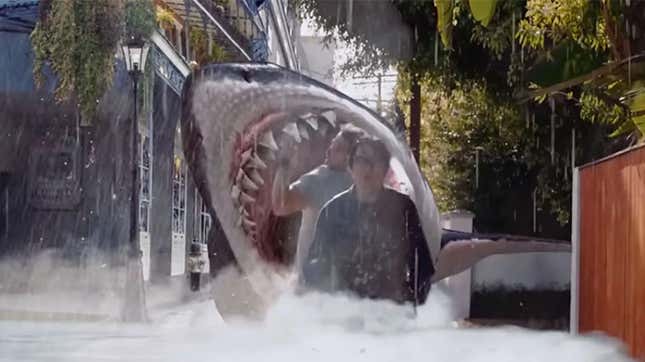
Big Shark review: Sharksploitation makes Room for one more
Tommy Wiseau still doesn't know how movies should be made, and that remains the appeal
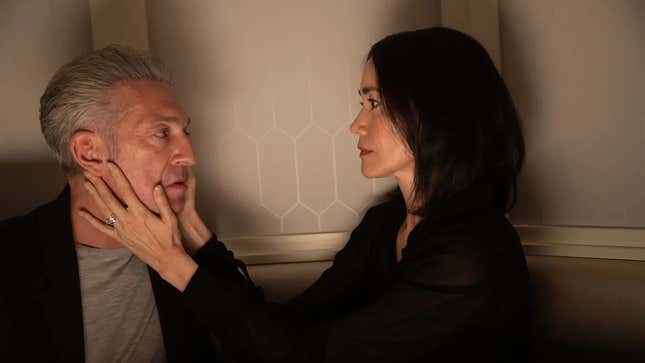
The Shrouds review: David Cronenberg won't look away from lost love
Death is front-and-center in the latest metaphor-heavy film from the body horror king

Atlas review: Netflix’s AI propaganda dulls J.Lo’s shine
Jennifer Lopez plays humanity’s last hope, battling bad robots in this slipshod sci-fi
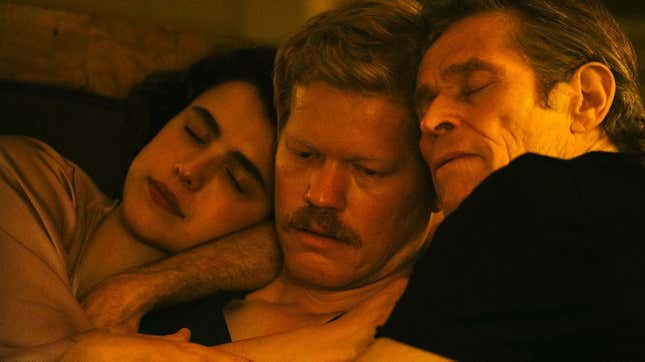
Kinds Of Kindness review: Peak Yorgos Lanthimos
The Greek freak is back with the kind of movie it feels perverse to say you “enjoy”
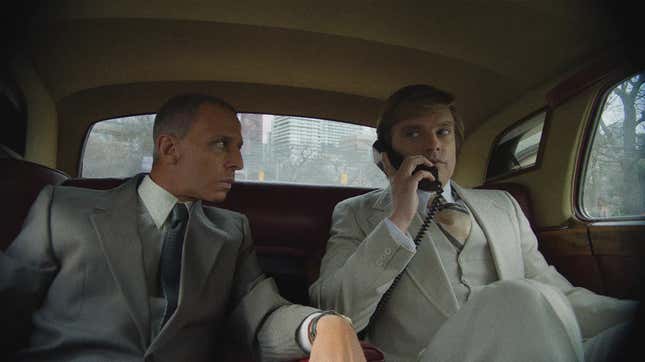
The Apprentice review: Roy Cohn and Donald Trump's dark alliance becomes high drama
The mentor/protégé relationship between two terrible people makes for compelling, well-acted drama

Thelma The Unicorn review: If only this film were as ambitious as its protagonist
The new animated feature from the creators of Napoleon Dynamite barely manages to clear the low bar it sets for …

Oh, Canada review: Paul Schrader’s fragmented look backwards
Less a deep rumination at the last moments of an artist’s life, and more a collection of confused ramblings

The Garfield Movie review: Identity-free adaptation is Garfield minus Garfield
This orange tabby bears little resemblance to the comic strips, but your youngest child isn’t likely to care
Advertisement

IMAGES
VIDEO
COMMENTS
To write a film review, start with an introduction that includes the film's title, director, and a brief overview. Then, summarize the plot without revealing spoilers. Analyze key elements like acting, direction, and cinematography. Offer your evaluation, highlighting the film's strengths and weaknesses.
Preparing to Write the Review While film reviews tend to be fairly short (approximately 600 to 1200 words), they require a lot of preparation before you begin writing. Prior to viewing the film, you may want to get a sense of the bodies of work by the director, writer, or individual actor. For instance, you may watch
FILM REVIEW: • Reviews tend to focus on the surface story, providing a lengthy description of the plot. • They typically make recommendations about whether the film is worth watching, so it is highly subjective and rather simplistic. • They do not meet the standards of academic writing. FILM ANALYSIS:
Whether it's for pleasure or a job assignment, writing a good movie review can be a useful exercise that allows you to explore your personal connection to a film. If you've recently watched a film and want to share your opinions about it, there are a few best practices that can help you compose a balanced, thoughtful, and entertaining movie review.
The most common types of film writing are movie reviews, most often found in popular media and critical and theoretical essays, which are commonly found in academia. Within these three genres, films are typically analyzed through six lenses: formalism, genre, historical, national cinema, auteur and ideology. The Movie Review.
A general movie review can have elements of the writer's personal tastes when describing the entertainment value of the movie. However, when the movie review is an academic review, the subject of the review is not entertainment value. While an academic movie review can touch on several subjects, the main thrust is ...
1. Watch the film at least once. For new reviewers, it's impossible to capture everything after one viewing. Watching the film first, then watching to take notes, is an easy way to improve the quality of your final review. This will also make it easy to recall in-the-moment thoughts and reactions.
Find a place to mention the director's name and the full movie title. If you feel you must discuss information that might "spoil" things for readers, warn them first. 2. Start to talk about the film's technical and artistic choices. Plot is just one piece of a movie, and shouldn't dictate your entire review.
Here are some useful tips to kick-start the movie review writing process: Watch the movie or documentary twice and take notes of both major and minor events and characters. It's a mistake to rely on the power of your memory only, there's always something we overlook or forget. Carry out a thorough research.
I. Introduction II. What is a Film Review? III. Importance of writing a Film Review IV. Structure and Format of a Film Review A. Introduction B. Summary and Synopsis C. Analysis and Evaluation D. Conclusion V. Tips for writing an Effective Film Review A. Watch the Film Multiple Times B. Take Notes and Analyze the Film C. Consider the Target Audience D. Use Proper Film Terminology E. Ensure a ...
The format should also follow the essay format, with an introduction and a thesis statement, body paragraphs, and a conclusion. The name of the movie or documentary should be mentioned in the introduction (as well as cited accurately in the bibliography). Briefly describe the plot of the movie. There are different ways to approach a film review ...
Students often write movie reviews as part of academic assignments or extracurricular activities to develop critical thinking skills, articulate opinions, and analyze various aspects of filmmaking. Writing a movie review enables them to express their perspectives on the film's storytelling, cinematography, performances, and thematic elements. ...
A remarkable aspect of a good film review is that it doesn't just rate the movie but provides explicit views that form the critique's basis. This form of writing, like crafting essays, research papers, and term papers, should be insightful and draw the reader in quickly. It's important to discuss the reputation of the lead actors and directors ...
Name of the director. Title of the book (if based on a book) Draft the review outline: Draft an outline with which you will write the review. The overview will help you organize your review concisely and logically. The outline is more like the skeletal frame on which the whole study will stand.
To write a movie review, take notes during the movie, decide on a writing style and begin with the positive points in the movie. Write a movie review with ti...
Academic Skills Office (ASO) - Fact Sheets Page | 1 . Writing a Critical Review You are probably familiar with the review genre such as film reviews or book reviews. A critical review is similar, as it is based on a close and detailed reading and evaluation of a text or comparison of multiple texts on the same topic.
Read each section of a text carefully and write down two things: 1) the main point or idea, and 2) its function in the text. In other words, write down what each section says and what it does. This will help you to see how the author develops their argument and uses evidence for support.
To find movie reviews or scholarly articles, try using these databases: ... including more than 7,300 peer-reviewed journals. Covers a wide range of academic subjects including the arts, humanities, social sciences, sciences, technology, and more. ... college students, and general viewers. Subject coverage includes film & television theory ...
Write your first draft. Create an outline that will help you to structure your review. Typically, you will need an introduction, body (review of story, technical characteristics, cast, directing), and conclusion. 8. Edit and proofread the text of your movie review.
Academic Writing 3 The Pillars of Academic Writing Academic writing is built upon three truths that aren't self-evident: - Writing is Thinking: While "writing" is traditionally understood as the expression of thought, we'll redefine "writing" as the thought process itself. Writing is not what you do with thought. Writing is
These subject searches also provide a way to find books which collect reviews, such as Pauline Kael's 5001 Nights at the Movies, and American Movie Critics: An Anthology From the Silents Until Now (ed. Phillip Lopate).. The following list covers additional sources of film reviews, primarily "authoritative" ones but also a handful of "popular" review websites and blogs.
Step 5 - Write your literature review. Like any other academic text, your literature review should have an introduction, a main body, and a conclusion. What you include in each depends on the objective of your literature review. Introduction. The introduction should clearly establish the focus and purpose of the literature review.
The Purdue On-Campus Writing Lab and Purdue Online Writing Lab assist clients in their development as writers—no matter what their skill level—with on-campus consultations, online participation, and community engagement. The Purdue Writing Lab serves the Purdue, West Lafayette, campus and coordinates with local literacy initiatives.
Media Files: APA Sample Student Paper , APA Sample Professional Paper This resource is enhanced by Acrobat PDF files. Download the free Acrobat Reader. Note: The APA Publication Manual, 7 th Edition specifies different formatting conventions for student and professional papers (i.e., papers written for credit in a course and papers intended for scholarly publication).
Paper Reviews ARE. Individualized feedback from a writing professional; For students working on coursework including discussion posts, course papers, master's capstones, and the doctoral premise and prospectus; Focused on skill building and instruction based on patterns in a student's draft; Asynchronous: There is no phone call or online ...
The final scene of Episode 4 (the last made available for review) captures a real sense of horror and fear when a villain is introduced. Perhaps that bodes well for the final four episodes in the ...
Course 2: Getting Started with Essay Writing. This is the second course in the Academic English: Writing specialization. By introducing you to three types of academic essays, this course will especially help prepare you for work in college classes, but anyone who wants to improve his or her writing skills can benefit from this course.
This dissertation aims to provide a deeper understanding of consumer emotions from user-generated content. In the first essay of my dissertation, "Digital Therapy for Negative Consumption Experiences: The Impact of Emotional and Rational Reviews on Review Writers and Readers," we examine whether the manner in which a consumer writes a review can help them recover from a negative ...
Everything you ever wanted to know about Film - Reviews. News, stories, photos, videos and more.